
google_workspace_mcp
Control Gmail, Google Calendar, Docs, Sheets, Slides, Chat, Forms, Tasks, Search & Drive with AI - Comprehensive Google Workspace / G Suite MCP Server & CLI Tool
Stars: 1464
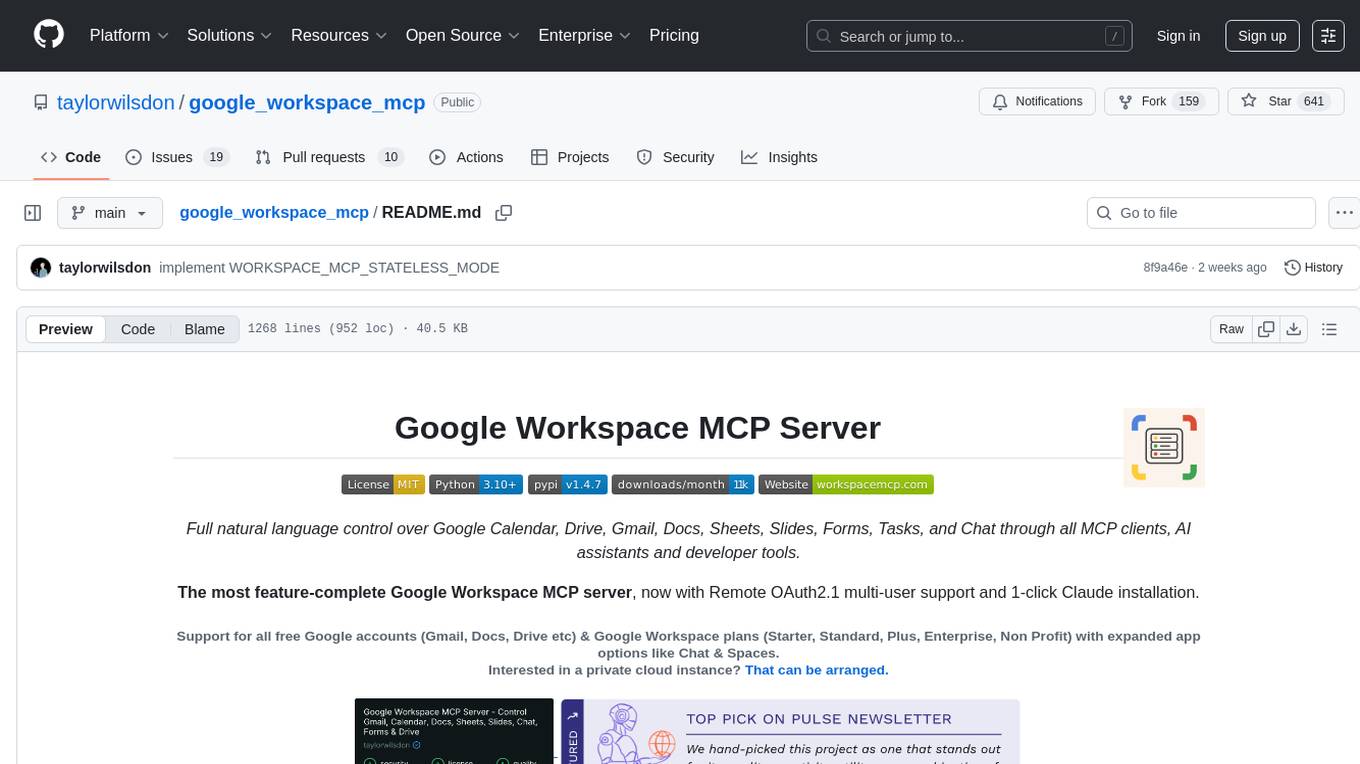
The Google Workspace MCP Server is a production-ready server that integrates major Google Workspace services with AI assistants. It supports single-user and multi-user authentication via OAuth 2.1, making it a powerful backend for custom applications. Built with FastMCP for optimal performance, it features advanced authentication handling, service caching, and streamlined development patterns. The server provides full natural language control over Google Calendar, Drive, Gmail, Docs, Sheets, Slides, Forms, Tasks, and Chat through all MCP clients, AI assistants, and developer tools. It supports free Google accounts and Google Workspace plans with expanded app options like Chat & Spaces. The server also offers private cloud instance options.
README:
Full natural language control over Google Calendar, Drive, Gmail, Docs, Sheets, Slides, Forms, Tasks, Contacts, and Chat through all MCP clients, AI assistants and developer tools. Now includes a full featured CLI for use with tools like Claude Code and Codex!
The most feature-complete Google Workspace MCP server, with Remote OAuth2.1 multi-user support and 1-click Claude installation.
Support for all free Google accounts (Gmail, Docs, Drive etc) & Google Workspace plans (Starter, Standard, Plus, Enterprise, Non Profit) with expanded app options like Chat & Spaces.
Interested in a private, managed cloud instance? That can be arranged.
See it in action:
◆ But why?
This README was written with AI assistance, and here's why that matters
As a solo dev building open source tools, comprehensive documentation often wouldn't happen without AI help. Using agentic dev tools like Roo & Claude Code that understand the entire codebase, AI doesn't just regurgitate generic content - it extracts real implementation details and creates accurate, specific documentation.
In this case, Sonnet 4 took a pass & a human (me) verified them 2/16/26.
A production-ready MCP server that integrates all major Google Workspace services with AI assistants. It supports both single-user operation and multi-user authentication via OAuth 2.1, making it a powerful backend for custom applications. Built with FastMCP for optimal performance, featuring advanced authentication handling, service caching, and streamlined development patterns.
Simplified Setup: Now uses Google Desktop OAuth clients - no redirect URIs or port configuration needed!
|
@ Gmail • ≡ Drive • ⧖ Calendar ≡ Docs
≡ Forms • @ Chat • ≡ Sheets • ≡ Slides
◆ Apps Script
|
⊠ Authentication & Security
✓ Tasks • 👤 Contacts • ◆ Custom Search
|
Quick Reference Card - Essential commands & configs at a glance
|
Credentials export GOOGLE_OAUTH_CLIENT_ID="..."
export GOOGLE_OAUTH_CLIENT_SECRET="..." |
Launch Commands uvx workspace-mcp --tool-tier core
uv run main.py --tools gmail drive |
Tool Tiers
|
-
Download: Grab the latest
google_workspace_mcp.dxtfrom the “Releases” page - Install: Double-click the file – Claude Desktop opens and prompts you to Install
- Configure: In Claude Desktop → Settings → Extensions → Google Workspace MCP, paste your Google OAuth credentials
- Use it: Start a new Claude chat and call any Google Workspace tool
Why DXT?
Desktop Extensions (
.dxt) bundle the server, dependencies, and manifest so users go from download → working MCP in one click – no terminal, no JSON editing, no version conflicts.
Environment Variables ← Click to configure in Claude Desktop
|
Required
|
Optional
|
Claude Desktop stores these securely in the OS keychain; set them once in the extension pane.
- Python 3.10+
- uvx (for instant installation) or uv (for development)
- Google Cloud Project with OAuth 2.0 credentials
Google Cloud Setup ← OAuth 2.0 credentials & API enablement
|
1. Create Project |
2. OAuth Credentials Download & save credentials |
3. Enable APIs See quick links below |
OAuth Credential Setup Guide ← Step-by-step instructionsComplete Setup Process:
|
||
Quick API Enable Links ← One-click enable each Google API
You can enable each one by clicking the links below (make sure you're logged into the Google Cloud Console and have the correct project selected):1.1. Credentials: See Credential Configuration for detailed setup options
- Environment Configuration:
◆ Environment Variables ← Configure your runtime environment
|
◆ Development Mode export OAUTHLIB_INSECURE_TRANSPORT=1Allows HTTP redirect URIs |
@ Default User export USER_GOOGLE_EMAIL=\
[email protected]Single-user authentication |
◆ Custom Search export GOOGLE_PSE_API_KEY=xxx
export GOOGLE_PSE_ENGINE_ID=yyyOptional: Search API setup |
- Server Configuration:
◆ Server Settings ← Customize ports, URIs & proxies
|
◆ Base Configuration export WORKSPACE_MCP_BASE_URI=
http://localhost
export WORKSPACE_MCP_PORT=8000
export WORKSPACE_MCP_HOST=0.0.0.0 # Use 127.0.0.1 for localhost-onlyServer URL & port settings |
↻ Proxy Support export MCP_ENABLE_OAUTH21=
trueLeverage multi-user OAuth2.1 clients |
@ Default Email export USER_GOOGLE_EMAIL=\
[email protected]Skip email in auth flows in single user mode |
≡ Configuration Details ← Learn more about each setting
| Variable | Description | Default |
|---|---|---|
WORKSPACE_MCP_BASE_URI |
Base server URI (no port) | http://localhost |
WORKSPACE_MCP_PORT |
Server listening port | 8000 |
WORKSPACE_MCP_HOST |
Server bind host | 0.0.0.0 |
WORKSPACE_EXTERNAL_URL |
External URL for reverse proxy setups | None |
WORKSPACE_ATTACHMENT_DIR |
Directory for downloaded attachments | ~/.workspace-mcp/attachments/ |
GOOGLE_OAUTH_REDIRECT_URI |
Override OAuth callback URL | Auto-constructed |
USER_GOOGLE_EMAIL |
Default auth email | None |
◆ Custom Search Configuration ← Enable web search capabilities
|
1. Create Search Engine |
2. Get API Key |
3. Set Variables export GOOGLE_PSE_API_KEY=\
"your-api-key"
export GOOGLE_PSE_ENGINE_ID=\
"your-engine-id"Configure in environment |
≡ Quick Setup Guide ← Step-by-step instructionsComplete Setup Process:
|
||
📌 Transport Mode Guidance: Use streamable HTTP mode (
--transport streamable-http) for all modern MCP clients including Claude Code, VS Code MCP, and MCP Inspector. Stdio mode is only for clients with incomplete MCP specification support.
▶ Launch Commands ← Choose your startup mode
|
▶ Legacy Mode uv run main.py |
◆ HTTP Mode (Recommended) uv run main.py \
--transport streamable-http✅ Full MCP spec compliance & OAuth 2.1 |
@ Single User uv run main.py \
--single-userSimplified authentication
|
◆ Advanced Options ← Tool selection, tiers & Docker▶ Selective Tool Loading # Load specific services only
uv run main.py --tools gmail drive calendar
uv run main.py --tools sheets docs
# Combine with other flags
uv run main.py --single-user --tools gmail🔒 Read-Only Mode # Requests only read-only scopes & disables write tools
uv run main.py --read-only
# Combine with specific tools or tiers
uv run main.py --tools gmail drive --read-only
uv run main.py --tool-tier core --read-onlyRead-only mode provides secure, restricted access by:
★ Tool Tiers uv run main.py --tool-tier core # ● Essential tools only
uv run main.py --tool-tier extended # ◐ Core + additional
uv run main.py --tool-tier complete # ○ All available tools◆ Docker Deployment docker build -t workspace-mcp .
docker run -p 8000:8000 -v $(pwd):/app \
workspace-mcp --transport streamable-http
# With tool selection via environment variables
docker run -e TOOL_TIER=core workspace-mcp
docker run -e TOOLS="gmail drive calendar" workspace-mcpAvailable Services: |
||
The server supports a CLI mode for direct tool invocation without running the full MCP server. This is ideal for scripting, automation, and use by coding agents (Codex, Claude Code).
▶ CLI Commands ← Direct tool execution from command line
|
▶ List Tools workspace-mcp --cli
workspace-mcp --cli list
workspace-mcp --cli list --jsonView all available tools |
◆ Tool Help workspace-mcp --cli search_gmail_messages --helpShow parameters and documentation |
|
▶ Run with Arguments workspace-mcp --cli search_gmail_messages \
--args '{"query": "is:unread"}'Execute tool with inline JSON |
◆ Pipe from Stdin echo '{"query": "is:unread"}' | \
workspace-mcp --cli search_gmail_messagesPass arguments via stdin |
≡ CLI Usage Details ← Complete reference
Command Structure:
workspace-mcp --cli [command] [options]Commands:
| Command | Description |
|---|---|
list (default) |
List all available tools |
<tool_name> |
Execute the specified tool |
<tool_name> --help |
Show detailed help for a tool |
Options:
| Option | Description |
|---|---|
--args, -a
|
JSON string with tool arguments |
--json, -j
|
Output in JSON format (for list command) |
--help, -h
|
Show help for a tool |
Examples:
# List all Gmail tools
workspace-mcp --cli list | grep gmail
# Search for unread emails
workspace-mcp --cli search_gmail_messages --args '{"query": "is:unread", "max_results": 5}'
# Get calendar events for today
workspace-mcp --cli get_events --args '{"calendar_id": "primary", "time_min": "2024-01-15T00:00:00Z"}'
# Create a Drive file from a URL
workspace-mcp --cli create_drive_file --args '{"name": "doc.pdf", "source_url": "https://example.com/file.pdf"}'
# Combine with jq for processing
workspace-mcp --cli list --json | jq '.tools[] | select(.name | contains("gmail"))'Notes:
- CLI mode uses OAuth 2.0 (same credentials as server mode)
- Authentication flows work the same way - browser opens for first-time auth
- Results are printed to stdout; errors go to stderr
- Exit code 0 on success, 1 on error
The server organizes tools into three progressive tiers for simplified deployment. Choose a tier that matches your usage needs and API quota requirements.
|
● Core ( ● Extended ( ● Complete ( |
▶ Start with |
# Basic tier selection
uv run main.py --tool-tier core # Start with essential tools only
uv run main.py --tool-tier extended # Expand to include management features
uv run main.py --tool-tier complete # Enable all available functionality
# Selective service loading with tiers
uv run main.py --tools gmail drive --tool-tier core # Core tools for specific services
uv run main.py --tools gmail --tool-tier extended # Extended Gmail functionality only
uv run main.py --tools docs sheets --tool-tier complete # Full access to Docs and Sheets🔑 OAuth Credentials Setup ← Essential for all installations
|
🚀 Environment Variables export GOOGLE_OAUTH_CLIENT_ID=\
"your-client-id"
export GOOGLE_OAUTH_CLIENT_SECRET=\
"your-secret"Best for production |
📁 File-based # Download & place in project root
client_secret.json
# Or specify custom path
export GOOGLE_CLIENT_SECRET_PATH=\
/path/to/secret.jsonTraditional method |
⚡ .env File cp .env.oauth21 .env
# Edit .env with credentialsBest for development |
📖 Credential Loading Details ← Understanding priority & best practicesLoading Priority
Why Environment Variables?
|
||
Note: All tools support automatic authentication via
@require_google_service()decorators with 30-minute service caching.
📅 Google Calendar |
||||||||||||||||||||||||||||||||||||||||||||||||||||||||||||||||||||||||||||||||||||||||||||||
| Tool | Tier | Description |
|---|---|---|
list_calendars |
Core | List accessible calendars |
get_events |
Core | Retrieve events with time range filtering |
create_event |
Core | Create events with attachments & reminders |
modify_event |
Core | Update existing events |
delete_event |
Extended | Remove events |
📁 Google Drive drive_tools.py
| Tool | Tier | Description |
|---|---|---|
search_drive_files |
Core | Search files with query syntax |
get_drive_file_content |
Core | Read file content (Office formats) |
get_drive_file_download_url |
Core | Download Drive files to local disk |
create_drive_file |
Core | Create files or fetch from URLs |
create_drive_folder |
Core | Create empty folders in Drive or shared drives |
import_to_google_doc |
Core | Import files (MD, DOCX, HTML, etc.) as Google Docs |
share_drive_file |
Core | Share file with users/groups/domains/anyone |
get_drive_shareable_link |
Core | Get shareable links for a file |
list_drive_items |
Extended | List folder contents |
copy_drive_file |
Extended | Copy existing files (templates) with optional renaming |
update_drive_file |
Extended | Update file metadata, move between folders |
batch_share_drive_file |
Extended | Share file with multiple recipients |
update_drive_permission |
Extended | Modify permission role |
remove_drive_permission |
Extended | Revoke file access |
transfer_drive_ownership |
Extended | Transfer file ownership to another user |
set_drive_file_permissions |
Extended | Set link sharing and file-level sharing settings |
get_drive_file_permissions |
Complete | Get detailed file permissions |
check_drive_file_public_access |
Complete | Check public sharing status |
📧 Gmail gmail_tools.py
| Tool | Tier | Description |
|---|---|---|
search_gmail_messages |
Core | Search with Gmail operators |
get_gmail_message_content |
Core | Retrieve message content |
get_gmail_messages_content_batch |
Core | Batch retrieve message content |
send_gmail_message |
Core | Send emails |
get_gmail_thread_content |
Extended | Get full thread content |
modify_gmail_message_labels |
Extended | Modify message labels |
list_gmail_labels |
Extended | List available labels |
manage_gmail_label |
Extended | Create/update/delete labels |
draft_gmail_message |
Extended | Create drafts |
get_gmail_threads_content_batch |
Complete | Batch retrieve thread content |
batch_modify_gmail_message_labels |
Complete | Batch modify labels |
start_google_auth |
Complete | Legacy OAuth 2.0 auth (disabled when OAuth 2.1 is enabled) |
📎 Email Attachments ← Send emails with files
Both send_gmail_message and draft_gmail_message support attachments via two methods:
Option 1: File Path (local server only)
attachments=[{"path": "/path/to/report.pdf"}]Reads file from disk, auto-detects MIME type. Optional filename override.
Option 2: Base64 Content (works everywhere)
attachments=[{
"filename": "report.pdf",
"content": "JVBERi0xLjQK...", # base64-encoded
"mime_type": "application/pdf" # optional
}]📥 Downloaded Attachment Storage ← Where downloaded files are saved
When downloading Gmail attachments (get_gmail_attachment_content) or Drive files (get_drive_file_download_url), files are saved to a persistent local directory rather than a temporary folder in the working directory.
Default location: ~/.workspace-mcp/attachments/
Files are saved with their original filename plus a short UUID suffix for uniqueness (e.g., invoice_a1b2c3d4.pdf). In stdio mode, the tool returns the absolute file path for direct filesystem access. In HTTP mode, it returns a download URL via the /attachments/{file_id} endpoint.
To customize the storage directory:
export WORKSPACE_ATTACHMENT_DIR="/path/to/custom/dir"Saved files expire after 1 hour and are cleaned up automatically.
📝 Google Docs docs_tools.py
| Tool | Tier | Description |
|---|---|---|
get_doc_content |
Core | Extract document text |
create_doc |
Core | Create new documents |
modify_doc_text |
Core | Modify document text (formatting + links) |
search_docs |
Extended | Find documents by name |
find_and_replace_doc |
Extended | Find and replace text |
list_docs_in_folder |
Extended | List docs in folder |
insert_doc_elements |
Extended | Add tables, lists, page breaks |
update_paragraph_style |
Extended | Apply heading styles, lists (bulleted/numbered with nesting), and paragraph formatting |
get_doc_as_markdown |
Extended | Export document as formatted Markdown with optional comments |
insert_doc_image |
Complete | Insert images from Drive/URLs |
update_doc_headers_footers |
Complete | Modify headers and footers |
batch_update_doc |
Complete | Execute multiple operations |
inspect_doc_structure |
Complete | Analyze document structure |
export_doc_to_pdf |
Extended | Export document to PDF |
create_table_with_data |
Complete | Create data tables |
debug_table_structure |
Complete | Debug table issues |
*_document_comments |
Complete | Read, Reply, Create, Resolve |
📊 Google Sheets sheets_tools.py
| Tool | Tier | Description |
|---|---|---|
read_sheet_values |
Core | Read cell ranges |
modify_sheet_values |
Core | Write/update/clear cells |
create_spreadsheet |
Core | Create new spreadsheets |
list_spreadsheets |
Extended | List accessible spreadsheets |
get_spreadsheet_info |
Extended | Get spreadsheet metadata |
format_sheet_range |
Extended | Apply colors, number formats, text wrapping, alignment, bold/italic, font size |
create_sheet |
Complete | Add sheets to existing files |
*_sheet_comment |
Complete | Read/create/reply/resolve comments |
🖼️ Google Slides slides_tools.py
| Tool | Tier | Description |
|---|---|---|
create_presentation |
Core | Create new presentations |
get_presentation |
Core | Retrieve presentation details |
batch_update_presentation |
Extended | Apply multiple updates |
get_page |
Extended | Get specific slide information |
get_page_thumbnail |
Extended | Generate slide thumbnails |
*_presentation_comment |
Complete | Read/create/reply/resolve comments |
📝 Google Forms forms_tools.py
| Tool | Tier | Description |
|---|---|---|
create_form |
Core | Create new forms |
get_form |
Core | Retrieve form details & URLs |
set_publish_settings |
Complete | Configure form settings |
get_form_response |
Complete | Get individual responses |
list_form_responses |
Extended | List all responses with pagination |
batch_update_form |
Complete | Apply batch updates (questions, settings) |
✓ Google Tasks tasks_tools.py
| Tool | Tier | Description |
|---|---|---|
list_tasks |
Core | List tasks with filtering |
get_task |
Core | Retrieve task details |
create_task |
Core | Create tasks with hierarchy |
update_task |
Core | Modify task properties |
delete_task |
Extended | Remove tasks |
move_task |
Complete | Reposition tasks |
clear_completed_tasks |
Complete | Hide completed tasks |
*_task_list |
Complete | List/get/create/update/delete task lists |
👤 Google Contacts contacts_tools.py
| Tool | Tier | Description |
|---|---|---|
search_contacts |
Core | Search contacts by name, email, phone |
get_contact |
Core | Retrieve detailed contact info |
list_contacts |
Core | List contacts with pagination |
create_contact |
Core | Create new contacts |
update_contact |
Extended | Update existing contacts |
delete_contact |
Extended | Delete contacts |
list_contact_groups |
Extended | List contact groups/labels |
get_contact_group |
Extended | Get group details with members |
batch_*_contacts |
Complete | Batch create/update/delete contacts |
*_contact_group |
Complete | Create/update/delete contact groups |
modify_contact_group_members |
Complete | Add/remove contacts from groups |
💬 Google Chat chat_tools.py
| Tool | Tier | Description |
|---|---|---|
list_spaces |
Extended | List chat spaces/rooms |
get_messages |
Core | Retrieve space messages |
send_message |
Core | Send messages to spaces |
search_messages |
Core | Search across chat history |
create_reaction |
Core | Add emoji reaction to a message |
download_chat_attachment |
Extended | Download attachment from a chat message |
🔍 Google Custom Search search_tools.py
| Tool | Tier | Description |
|---|---|---|
search_custom |
Core | Perform web searches |
get_search_engine_info |
Complete | Retrieve search engine metadata |
search_custom_siterestrict |
Extended | Search within specific domains |
Google Apps Script apps_script_tools.py
| Tool | Tier | Description |
|---|---|---|
list_script_projects |
Core | List accessible Apps Script projects |
get_script_project |
Core | Get complete project with all files |
get_script_content |
Core | Retrieve specific file content |
create_script_project |
Core | Create new standalone or bound project |
update_script_content |
Core | Update or create script files |
run_script_function |
Core | Execute function with parameters |
create_deployment |
Extended | Create new script deployment |
list_deployments |
Extended | List all project deployments |
update_deployment |
Extended | Update deployment configuration |
delete_deployment |
Extended | Remove deployment |
list_script_processes |
Extended | View recent executions and status |
Tool Tier Legend:
- • Core: Essential tools for basic functionality • Minimal API usage • Getting started
- • Extended: Core tools + additional features • Regular usage • Expanded capabilities
- • Complete: All available tools including advanced features • Power users • Full API access
The server supports two transport modes:
⚠️ Important: Stdio mode is a legacy fallback for clients that don't properly implement the MCP specification with OAuth 2.1 and streamable HTTP support. Claude Code and other modern MCP clients should use streamable HTTP mode (--transport streamable-http) for proper OAuth flow and multi-user support.
In general, you should use the one-click DXT installer package for Claude Desktop.
If you are unable to for some reason, you can configure it manually via claude_desktop_config.json
Manual Claude Configuration (Alternative)
📝 Claude Desktop JSON Config ← Click for manual setup instructions
-
Open Claude Desktop Settings → Developer → Edit Config
-
macOS:
~/Library/Application Support/Claude/claude_desktop_config.json -
Windows:
%APPDATA%\Claude\claude_desktop_config.json
-
macOS:
-
Add the server configuration:
{
"mcpServers": {
"google_workspace": {
"command": "uvx",
"args": ["workspace-mcp"],
"env": {
"GOOGLE_OAUTH_CLIENT_ID": "your-client-id",
"GOOGLE_OAUTH_CLIENT_SECRET": "your-secret",
"OAUTHLIB_INSECURE_TRANSPORT": "1"
}
}
}
}Add a new MCP server in LM Studio (Settings → MCP Servers) using the same JSON format:
{
"mcpServers": {
"google_workspace": {
"command": "uvx",
"args": ["workspace-mcp"],
"env": {
"GOOGLE_OAUTH_CLIENT_ID": "your-client-id",
"GOOGLE_OAUTH_CLIENT_SECRET": "your-secret",
"OAUTHLIB_INSECURE_TRANSPORT": "1",
}
}
}
}If you’re developing, deploying to servers, or using another MCP-capable client, keep reading.
⚡ Quick Start with uvx ← No installation required!
# Requires Python 3.10+ and uvx
# First, set credentials (see Credential Configuration above)
uvx workspace-mcp --tool-tier core # or --tools gmail drive calendarNote: Configure OAuth credentials before running. Supports environment variables,
.envfile, orclient_secret.json.
🛠️ Developer Workflow ← Install deps, lint, and test
# Install everything needed for linting, tests, and release tooling
uv sync --group dev
# Run the same linter that git hooks invoke automatically
uv run ruff check .
# Execute the full test suite (async fixtures require pytest-asyncio)
uv run pytest-
uv sync --group testinstalls only the testing stack if you need a slimmer environment. -
uv run main.py --transport streamable-httplaunches the server with your checked-out code for manual verification. - Ruff is part of the
devgroup because pre-push hooks callruff checkautomatically—run it locally before committing to avoid hook failures.
The server includes OAuth 2.1 support for bearer token authentication, enabling multi-user session management. OAuth 2.1 automatically reuses your existing GOOGLE_OAUTH_CLIENT_ID and GOOGLE_OAUTH_CLIENT_SECRET credentials - no additional configuration needed!
When to use OAuth 2.1:
- Multiple users accessing the same MCP server instance
- Need for bearer token authentication instead of passing user emails
- Building web applications or APIs on top of the MCP server
- Production environments requiring secure session management
- Browser-based clients requiring CORS support
OAuth 2.1 mode (MCP_ENABLE_OAUTH21=true) cannot be used together with the --single-user flag:
- Single-user mode: For legacy clients that pass user emails in tool calls
- OAuth 2.1 mode: For modern multi-user scenarios with bearer token authentication
Choose one authentication method - using both will result in a startup error.
Enabling OAuth 2.1:
To enable OAuth 2.1, set the MCP_ENABLE_OAUTH21 environment variable to true.
# OAuth 2.1 requires HTTP transport mode
export MCP_ENABLE_OAUTH21=true
uv run main.py --transport streamable-httpIf MCP_ENABLE_OAUTH21 is not set to true, the server will use legacy authentication, which is suitable for clients that do not support OAuth 2.1.
🔐 How the FastMCP GoogleProvider handles OAuth ← Advanced OAuth 2.1 details
FastMCP ships a native GoogleProvider that we now rely on directly. It solves the two tricky parts of using Google OAuth with MCP clients:
-
Dynamic Client Registration: Google still doesn't support OAuth 2.1 DCR, but the FastMCP provider exposes the full DCR surface and forwards registrations to Google using your fixed credentials. MCP clients register as usual and the provider hands them your Google client ID/secret under the hood.
-
CORS & Browser Compatibility: The provider includes an OAuth proxy that serves all discovery, authorization, and token endpoints with proper CORS headers. We no longer maintain custom
/oauth2/*routes—the provider handles the upstream exchanges securely and advertises the correct metadata to clients.
The result is a leaner server that still enables any OAuth 2.1 compliant client (including browser-based ones) to authenticate through Google without bespoke code.
The server supports a stateless mode designed for containerized environments where file system writes should be avoided:
Enabling Stateless Mode:
# Stateless mode requires OAuth 2.1 to be enabled
export MCP_ENABLE_OAUTH21=true
export WORKSPACE_MCP_STATELESS_MODE=true
uv run main.py --transport streamable-httpKey Features:
- No file system writes: Credentials are never written to disk
- No debug logs: File-based logging is completely disabled
- Memory-only sessions: All tokens stored in memory via OAuth 2.1 session store
- Container-ready: Perfect for Docker, Kubernetes, and serverless deployments
- Token per request: Each request must include a valid Bearer token
Requirements:
- Must be used with
MCP_ENABLE_OAUTH21=true - Incompatible with single-user mode
- Clients must handle OAuth flow and send valid tokens with each request
This mode is ideal for:
- Cloud deployments where persistent storage is unavailable
- Multi-tenant environments requiring strict isolation
- Containerized applications with read-only filesystems
- Serverless functions and ephemeral compute environments
MCP Inspector: No additional configuration needed with desktop OAuth client.
Claude Code: No additional configuration needed with desktop OAuth client.
The server supports pluggable storage backends for OAuth proxy state management via FastMCP 2.13.0+. Choose a backend based on your deployment needs.
Available Backends:
| Backend | Best For | Persistence | Multi-Server |
|---|---|---|---|
| Memory | Development, testing | ❌ | ❌ |
| Disk | Single-server production | ✅ | ❌ |
| Valkey/Redis | Distributed production | ✅ | ✅ |
Configuration:
# Memory storage (fast, no persistence)
export WORKSPACE_MCP_OAUTH_PROXY_STORAGE_BACKEND=memory
# Disk storage (persists across restarts)
export WORKSPACE_MCP_OAUTH_PROXY_STORAGE_BACKEND=disk
export WORKSPACE_MCP_OAUTH_PROXY_DISK_DIRECTORY=~/.fastmcp/oauth-proxy
# Valkey/Redis storage (distributed, multi-server)
export WORKSPACE_MCP_OAUTH_PROXY_STORAGE_BACKEND=valkey
export WORKSPACE_MCP_OAUTH_PROXY_VALKEY_HOST=redis.example.com
export WORKSPACE_MCP_OAUTH_PROXY_VALKEY_PORT=6379Valkey support is optional. Install
workspace-mcp[valkey](orpy-key-value-aio[valkey]) only if you enable the Valkey backend. Windows: buildingvalkey-glidefrom source requires MSVC C++ build tools with C11 support. If you seeaws-lc-sysC11 errors, setCFLAGS=/std:c11.
🔐 Valkey/Redis Configuration Options
| Variable | Default | Description |
|---|---|---|
WORKSPACE_MCP_OAUTH_PROXY_VALKEY_HOST |
localhost | Valkey/Redis host |
WORKSPACE_MCP_OAUTH_PROXY_VALKEY_PORT |
6379 | Port (6380 auto-enables TLS) |
WORKSPACE_MCP_OAUTH_PROXY_VALKEY_DB |
0 | Database number |
WORKSPACE_MCP_OAUTH_PROXY_VALKEY_USE_TLS |
auto | Enable TLS (auto if port 6380) |
WORKSPACE_MCP_OAUTH_PROXY_VALKEY_USERNAME |
- | Authentication username |
WORKSPACE_MCP_OAUTH_PROXY_VALKEY_PASSWORD |
- | Authentication password |
WORKSPACE_MCP_OAUTH_PROXY_VALKEY_REQUEST_TIMEOUT_MS |
5000 | Request timeout for remote hosts |
WORKSPACE_MCP_OAUTH_PROXY_VALKEY_CONNECTION_TIMEOUT_MS |
10000 | Connection timeout for remote hosts |
Encryption: Disk and Valkey storage are encrypted with Fernet. The encryption key is derived from FASTMCP_SERVER_AUTH_GOOGLE_JWT_SIGNING_KEY if set, otherwise from GOOGLE_OAUTH_CLIENT_SECRET.
The server supports an external OAuth 2.1 provider mode for scenarios where authentication is handled by an external system. In this mode, the MCP server does not manage the OAuth flow itself but expects valid bearer tokens in the Authorization header of tool calls.
Enabling External OAuth 2.1 Provider Mode:
# External OAuth provider mode requires OAuth 2.1 to be enabled
export MCP_ENABLE_OAUTH21=true
export EXTERNAL_OAUTH21_PROVIDER=true
uv run main.py --transport streamable-httpHow It Works:
-
Protocol-level auth disabled: MCP handshake (
initialize) andtools/listdo not require authentication -
Tool-level auth required: All tool calls must include
Authorization: Bearer <token>header - External OAuth flow: Your external system handles the OAuth flow and obtains Google access tokens
- Token validation: Server validates bearer tokens via Google's tokeninfo API
- Multi-user support: Each request is authenticated independently based on its bearer token
Key Features:
- No local OAuth flow: Server does not provide OAuth callback endpoints or manage OAuth state
- Bearer token only: All authentication via Authorization headers
-
Stateless by design: Works seamlessly with
WORKSPACE_MCP_STATELESS_MODE=true - External identity providers: Integrate with your existing authentication infrastructure
- Tool discovery: Clients can list available tools without authentication
Requirements:
- Must be used with
MCP_ENABLE_OAUTH21=true - OAuth credentials still required for token validation (
GOOGLE_OAUTH_CLIENT_ID,GOOGLE_OAUTH_CLIENT_SECRET) - External system must obtain valid Google OAuth access tokens (ya29.*)
- Each tool call request must include valid bearer token
Use Cases:
- Integrating with existing authentication systems
- Custom OAuth flows managed by your application
- API gateways that handle authentication upstream
- Multi-tenant SaaS applications with centralized auth
- Mobile or web apps with their own OAuth implementation
✅ Recommended: VS Code MCP extension properly supports the full MCP specification. Always use HTTP transport mode for proper OAuth 2.1 authentication.
🆚 VS Code Configuration ← Setup for VS Code MCP extension
{
"servers": {
"google-workspace": {
"url": "http://localhost:8000/mcp/",
"type": "http"
}
}
}Note: Make sure to start the server with --transport streamable-http when using VS Code MCP.
✅ Recommended: Claude Code is a modern MCP client that properly supports the full MCP specification. Always use HTTP transport mode with Claude Code for proper OAuth 2.1 authentication and multi-user support.
🆚 Claude Code Configuration ← Setup for Claude Code MCP support
# Start the server in HTTP mode first
uv run main.py --transport streamable-http
# Then add to Claude Code
claude mcp add --transport http workspace-mcp http://localhost:8000/mcpIf you're running the MCP server behind a reverse proxy (nginx, Apache, Cloudflare, etc.), you have two configuration options:
Problem: When behind a reverse proxy, the server constructs OAuth URLs using internal ports (e.g., http://localhost:8000) but external clients need the public URL (e.g., https://your-domain.com).
Solution 1: Set WORKSPACE_EXTERNAL_URL for all OAuth endpoints:
# This configures all OAuth endpoints to use your external URL
export WORKSPACE_EXTERNAL_URL="https://your-domain.com"Solution 2: Set GOOGLE_OAUTH_REDIRECT_URI for just the callback:
# This only overrides the OAuth callback URL
export GOOGLE_OAUTH_REDIRECT_URI="https://your-domain.com/oauth2callback"You also have options for:
| OAUTH_CUSTOM_REDIRECT_URIS (optional) | Comma-separated list of additional redirect URIs |
| OAUTH_ALLOWED_ORIGINS (optional) | Comma-separated list of additional CORS origins |
Important:
- Use
WORKSPACE_EXTERNAL_URLwhen all OAuth endpoints should use the external URL (recommended for reverse proxy setups) - Use
GOOGLE_OAUTH_REDIRECT_URIwhen you only need to override the callback URL - The redirect URI must exactly match what's configured in your Google Cloud Console
- Your reverse proxy must forward OAuth-related requests (
/oauth2callback,/oauth2/*,/.well-known/*) to the MCP server
🚀 Advanced uvx Commands ← More startup options
# Configure credentials first (see Credential Configuration section)
# Start with specific tools only
uvx workspace-mcp --tools gmail drive calendar tasks
# Start with tool tiers (recommended for most users)
uvx workspace-mcp --tool-tier core # Essential tools
uvx workspace-mcp --tool-tier extended # Core + additional features
uvx workspace-mcp --tool-tier complete # All tools
# Start in HTTP mode for debugging
uvx workspace-mcp --transport streamable-httpRequires Python 3.10+ and uvx. The package is available on PyPI.
For development or customization:
git clone https://github.com/taylorwilsdon/google_workspace_mcp.git
cd google_workspace_mcp
uv run main.pyDevelopment Installation (For Contributors):
🔧 Developer Setup JSON ← For contributors & customization
{
"mcpServers": {
"google_workspace": {
"command": "uv",
"args": [
"run",
"--directory",
"/path/to/repo/google_workspace_mcp",
"main.py"
],
"env": {
"GOOGLE_OAUTH_CLIENT_ID": "your-client-id",
"GOOGLE_OAUTH_CLIENT_SECRET": "your-secret",
"OAUTHLIB_INSECURE_TRANSPORT": "1"
}
}
}
}If you need to use HTTP mode with Claude Desktop:
{
"mcpServers": {
"google_workspace": {
"command": "npx",
"args": ["mcp-remote", "http://localhost:8000/mcp"]
}
}
}Note: Make sure to start the server with --transport streamable-http when using HTTP mode.
The server uses Google Desktop OAuth for simplified authentication:
- No redirect URIs needed: Desktop OAuth clients handle authentication without complex callback URLs
- Automatic flow: The server manages the entire OAuth process transparently
- Transport-agnostic: Works seamlessly in both stdio and HTTP modes
When calling a tool:
- Server returns authorization URL
- Open URL in browser and authorize
- Google provides an authorization code
- Paste the code when prompted (or it's handled automatically)
- Server completes authentication and retries your request
google_workspace_mcp/
├── auth/ # Authentication system with decorators
├── core/ # MCP server and utilities
├── g{service}/ # Service-specific tools
├── main.py # Server entry point
├── client_secret.json # OAuth credentials (not committed)
└── pyproject.toml # Dependencies
from auth.service_decorator import require_google_service
@require_google_service("drive", "drive_read") # Service + scope group
async def your_new_tool(service, param1: str, param2: int = 10):
"""Tool description"""
# service is automatically injected and cached
result = service.files().list().execute()
return result # Return native Python objects- Service Caching: 30-minute TTL reduces authentication overhead
-
Scope Management: Centralized in
SCOPE_GROUPSfor easy maintenance - Error Handling: Native exceptions instead of manual error construction
-
Multi-Service Support:
@require_multiple_services()for complex tools
The server includes an abstract credential store API and a default backend for managing Google OAuth credentials with support for multiple storage backends:
Features:
-
Abstract Interface:
CredentialStorebase class defines standard operations (get, store, delete, list users) -
Local File Storage:
LocalDirectoryCredentialStoreimplementation stores credentials as JSON files -
Configurable Storage: Environment variable
GOOGLE_MCP_CREDENTIALS_DIRsets storage location - Multi-User Support: Store and manage credentials for multiple Google accounts
- Automatic Directory Creation: Storage directory is created automatically if it doesn't exist
Configuration:
# Optional: Set custom credentials directory
export GOOGLE_MCP_CREDENTIALS_DIR="/path/to/credentials"
# Default locations (if GOOGLE_MCP_CREDENTIALS_DIR not set):
# - ~/.google_workspace_mcp/credentials (if home directory accessible)
# - ./.credentials (fallback)Usage Example:
from auth.credential_store import get_credential_store
# Get the global credential store instance
store = get_credential_store()
# Store credentials for a user
store.store_credential("[email protected]", credentials)
# Retrieve credentials
creds = store.get_credential("[email protected]")
# List all users with stored credentials
users = store.list_users()The credential store automatically handles credential serialization, expiry parsing, and provides error handling for storage operations.
-
Credentials: Never commit
.env,client_secret.jsonor the.credentials/directory to source control! -
OAuth Callback: Uses
http://localhost:8000/oauth2callbackfor development (requiresOAUTHLIB_INSECURE_TRANSPORT=1) - Transport-Aware Callbacks: Stdio mode starts a minimal HTTP server only for OAuth, ensuring callbacks work in all modes
- Production: Use HTTPS & OAuth 2.1 and configure accordingly
- Scope Minimization: Tools request only necessary permissions
-
Local File Access Control: Tools that read local files (e.g., attachments,
file://uploads) are restricted to the user's home directory by default. Override this with theALLOWED_FILE_DIRSenvironment variable:Regardless of the allowlist, access to sensitive paths (# Colon-separated list of directories (semicolon on Windows) from which local file reads are permitted export ALLOWED_FILE_DIRS="/home/user/documents:/data/shared"
.env,.ssh/,.aws/,/etc/shadow, credential files, etc.) is always blocked.
MIT License - see LICENSE file for details.
For Tasks:
Click tags to check more tools for each tasksFor Jobs:
Alternative AI tools for google_workspace_mcp
Similar Open Source Tools

google_workspace_mcp
The Google Workspace MCP Server is a production-ready server that integrates major Google Workspace services with AI assistants. It supports single-user and multi-user authentication via OAuth 2.1, making it a powerful backend for custom applications. Built with FastMCP for optimal performance, it features advanced authentication handling, service caching, and streamlined development patterns. The server provides full natural language control over Google Calendar, Drive, Gmail, Docs, Sheets, Slides, Forms, Tasks, and Chat through all MCP clients, AI assistants, and developer tools. It supports free Google accounts and Google Workspace plans with expanded app options like Chat & Spaces. The server also offers private cloud instance options.
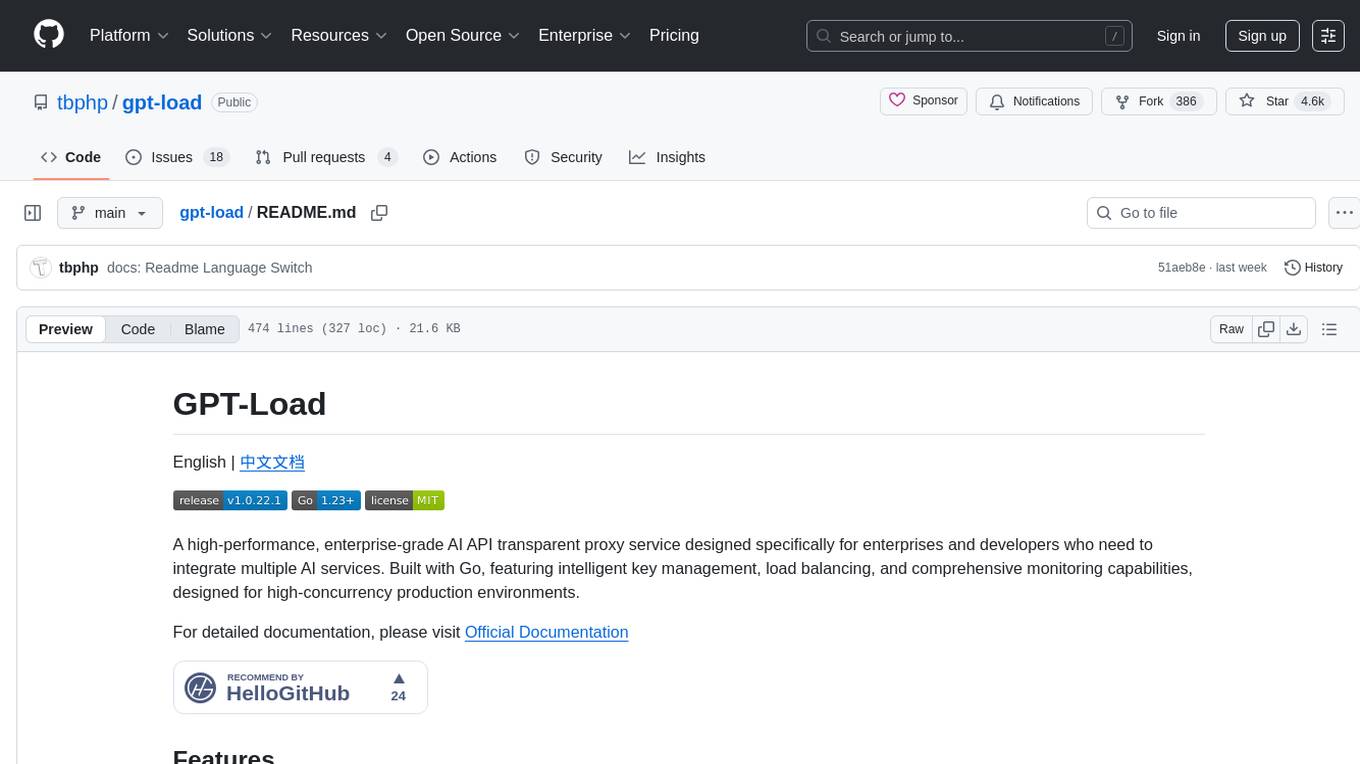
gpt-load
GPT-Load is a high-performance, enterprise-grade AI API transparent proxy service designed for enterprises and developers needing to integrate multiple AI services. Built with Go, it features intelligent key management, load balancing, and comprehensive monitoring capabilities for high-concurrency production environments. The tool serves as a transparent proxy service, preserving native API formats of various AI service providers like OpenAI, Google Gemini, and Anthropic Claude. It supports dynamic configuration, distributed leader-follower deployment, and a Vue 3-based web management interface. GPT-Load is production-ready with features like dual authentication, graceful shutdown, and error recovery.
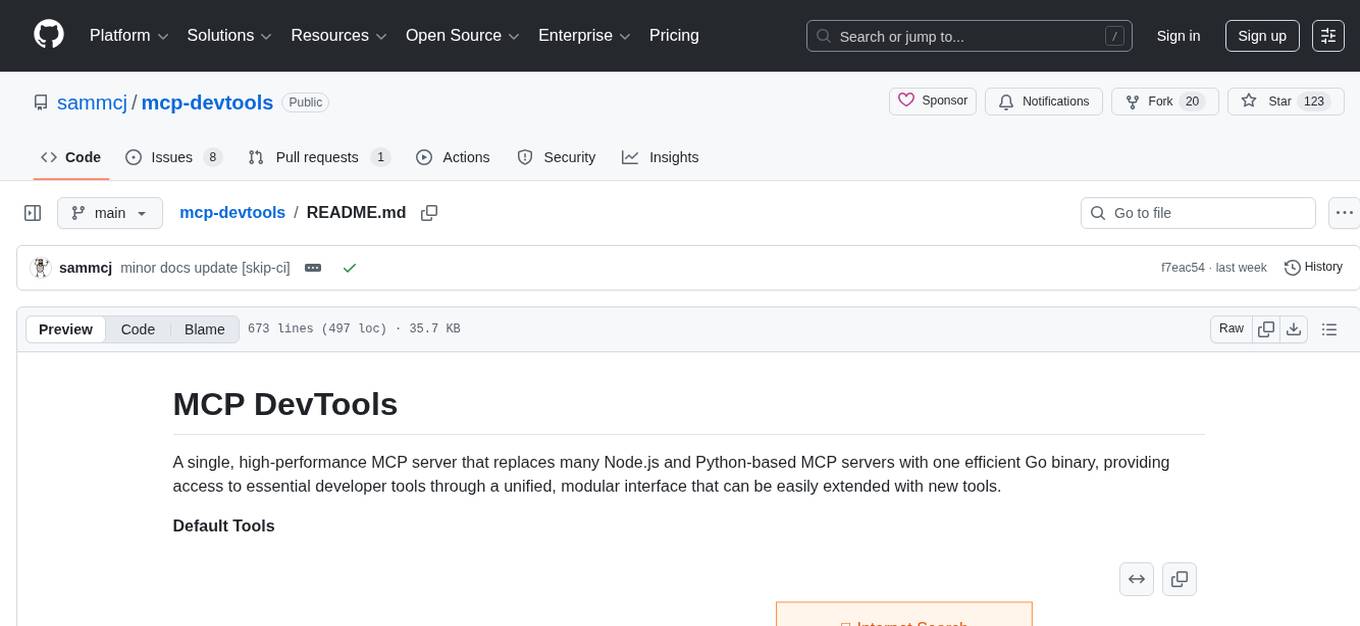
mcp-devtools
MCP DevTools is a high-performance server written in Go that replaces multiple Node.js and Python-based servers. It provides access to essential developer tools through a unified, modular interface. The server is efficient, with minimal memory footprint and fast response times. It offers a comprehensive tool suite for agentic coding, including 20+ essential developer agent tools. The tool registry allows for easy addition of new tools. The server supports multiple transport modes, including STDIO, HTTP, and SSE. It includes a security framework for multi-layered protection and a plugin system for adding new tools.
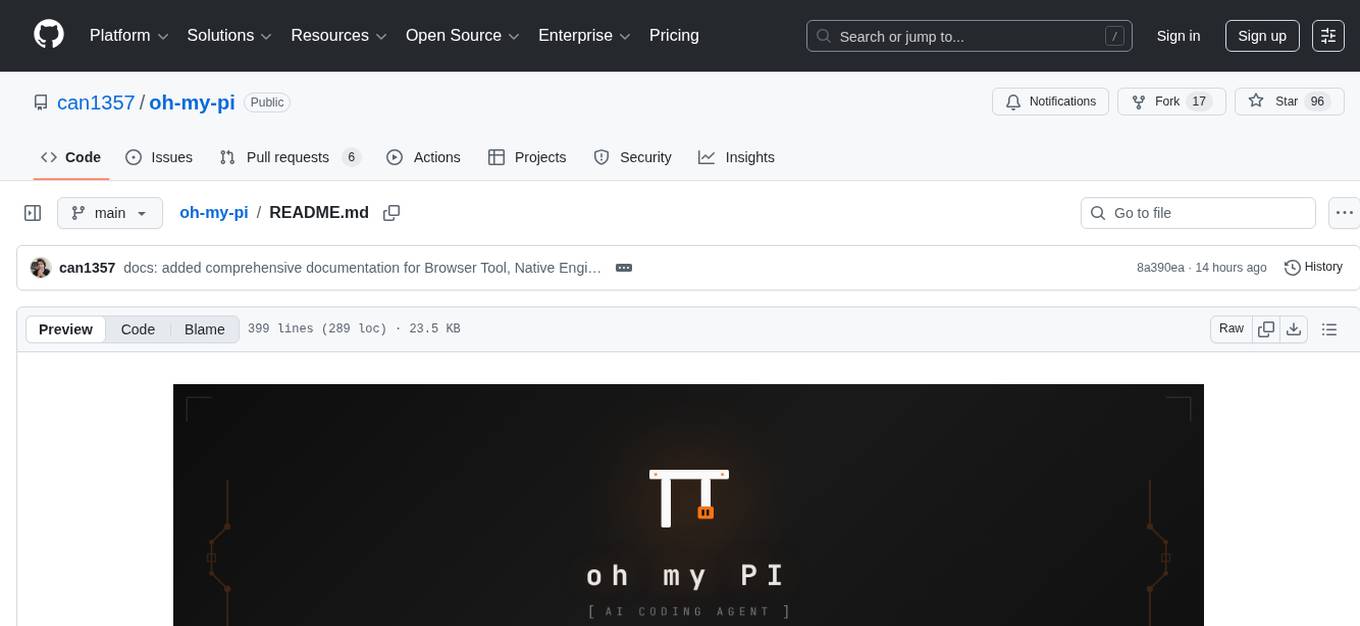
oh-my-pi
oh-my-pi is an AI coding agent for the terminal, providing tools for interactive coding, AI-powered git commits, Python code execution, LSP integration, time-traveling streamed rules, interactive code review, task management, interactive questioning, custom TypeScript slash commands, universal config discovery, MCP & plugin system, web search & fetch, SSH tool, Cursor provider integration, multi-credential support, image generation, TUI overhaul, edit fuzzy matching, and more. It offers a modern terminal interface with smart session management, supports multiple AI providers, and includes various tools for coding, task management, code review, and interactive questioning.
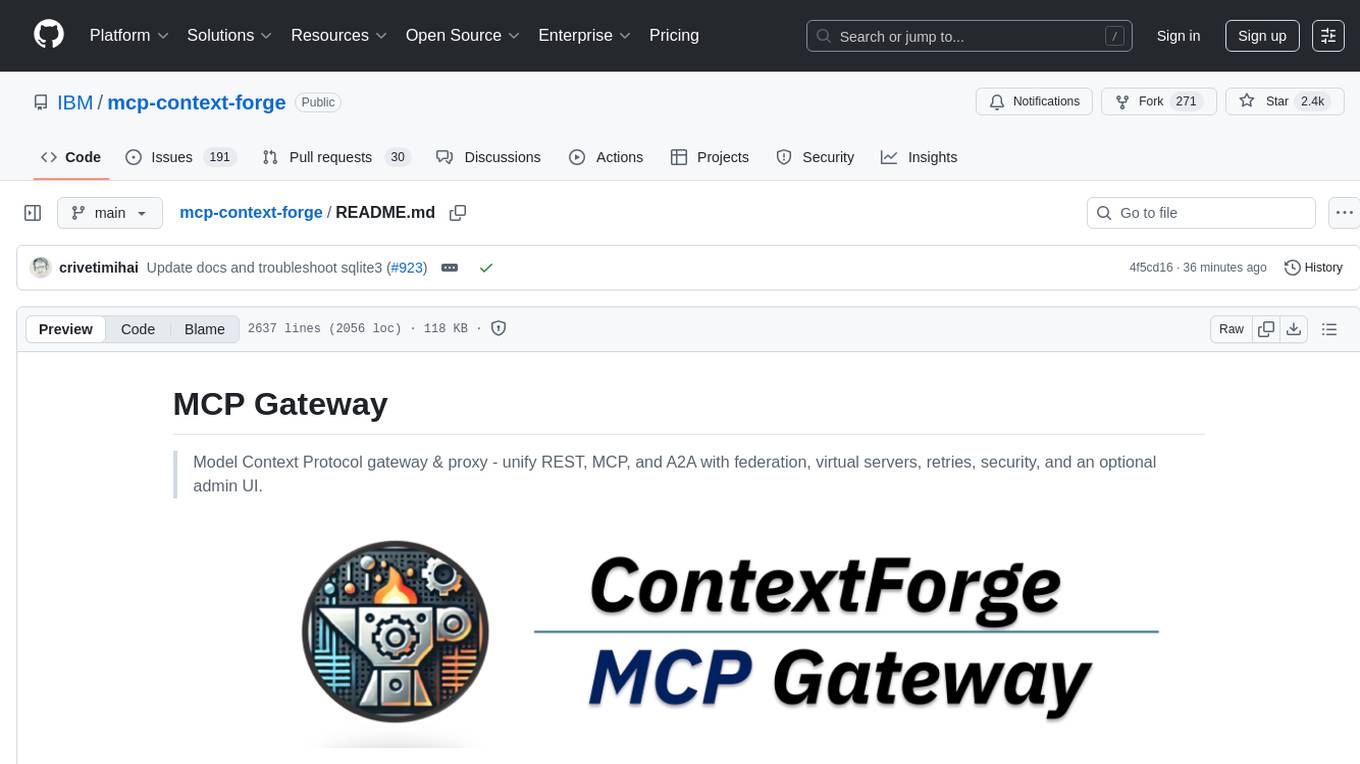
mcp-context-forge
MCP Context Forge is a powerful tool for generating context-aware data for machine learning models. It provides functionalities to create diverse datasets with contextual information, enhancing the performance of AI algorithms. The tool supports various data formats and allows users to customize the context generation process easily. With MCP Context Forge, users can efficiently prepare training data for tasks requiring contextual understanding, such as sentiment analysis, recommendation systems, and natural language processing.
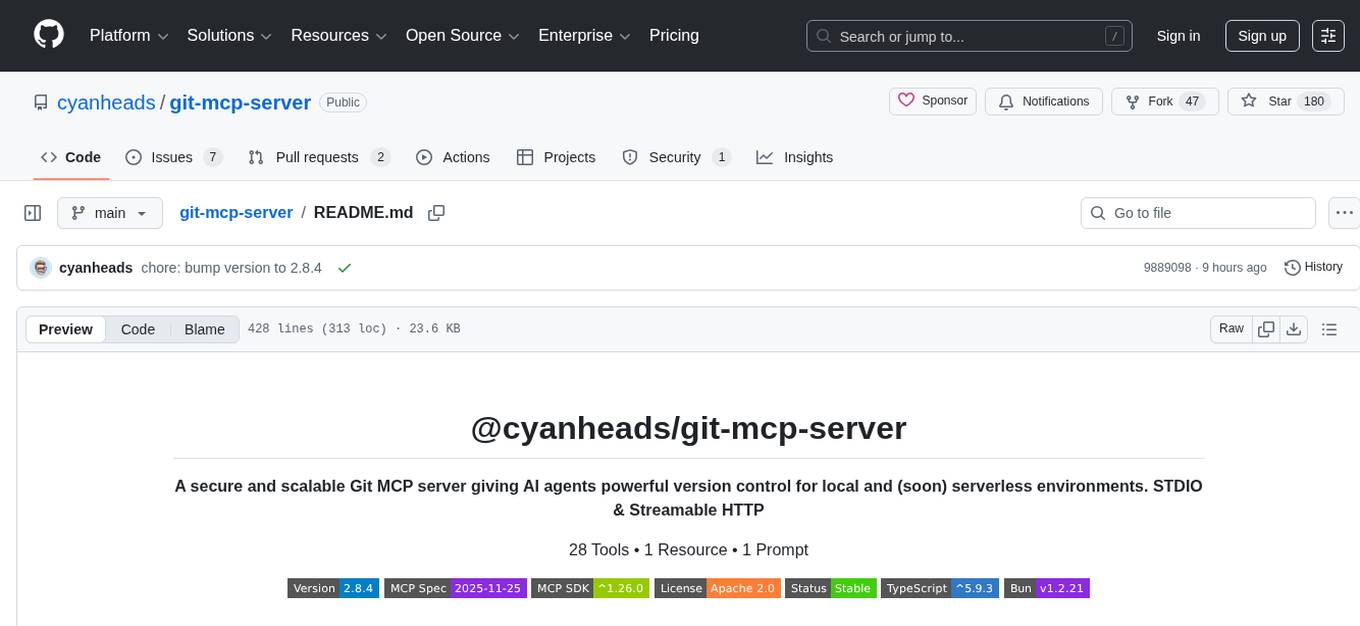
git-mcp-server
A secure and scalable Git MCP server providing AI agents with powerful version control capabilities for local and serverless environments. It offers 28 comprehensive Git operations organized into seven functional categories, resources for contextual information about the Git environment, and structured prompt templates for guiding AI agents through complex workflows. The server features declarative tools, robust error handling, pluggable authentication, abstracted storage, full-stack observability, dependency injection, and edge-ready architecture. It also includes specialized features for Git integration such as cross-runtime compatibility, provider-based architecture, optimized Git execution, working directory management, configurable Git identity, safety features, and commit signing.
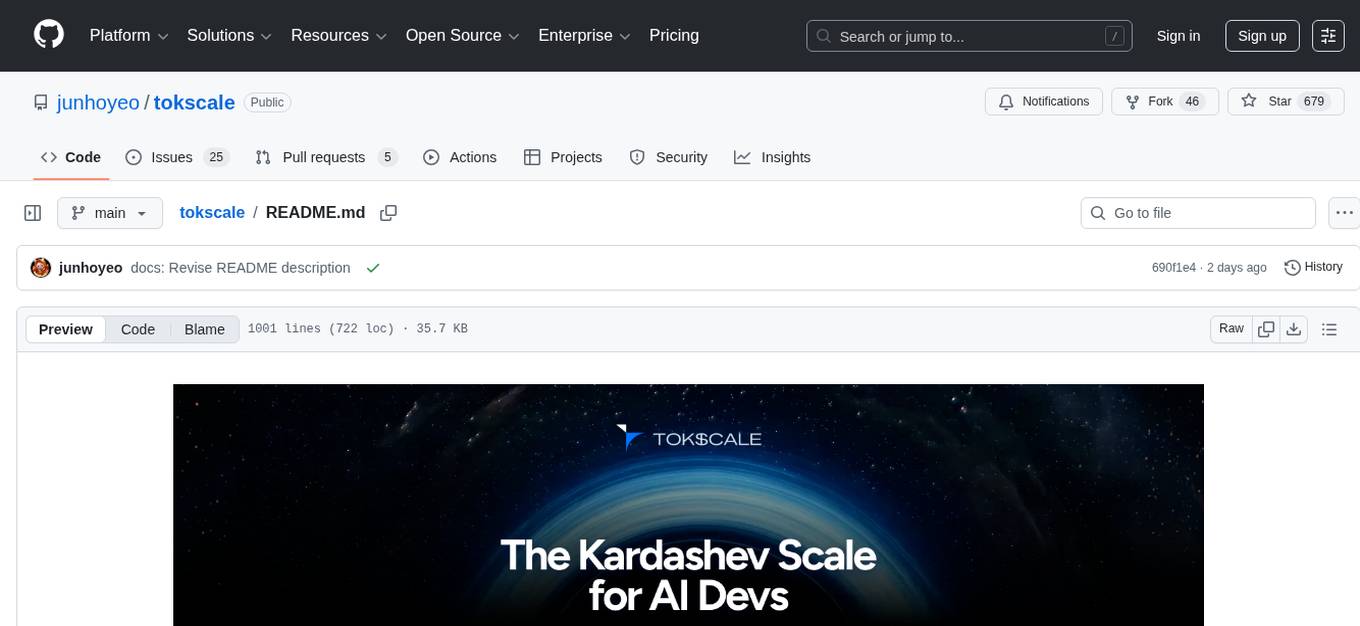
tokscale
Tokscale is a high-performance CLI tool and visualization dashboard for tracking token usage and costs across multiple AI coding agents. It helps monitor and analyze token consumption from various AI coding tools, providing real-time pricing calculations using LiteLLM's pricing data. Inspired by the Kardashev scale, Tokscale measures token consumption as users scale the ranks of AI-augmented development. It offers interactive TUI mode, multi-platform support, real-time pricing, detailed breakdowns, web visualization, flexible filtering, and social platform features.
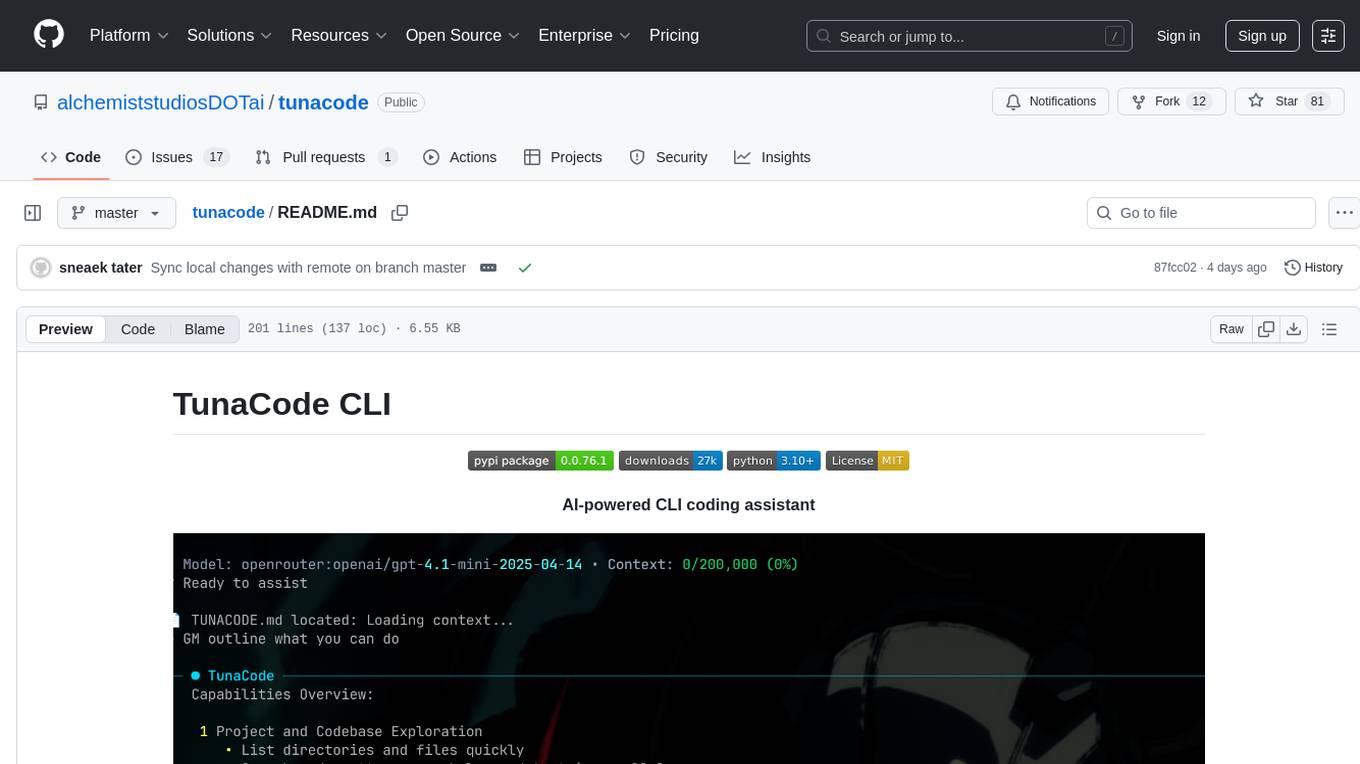
tunacode
TunaCode CLI is an AI-powered coding assistant that provides a command-line interface for developers to enhance their coding experience. It offers features like model selection, parallel execution for faster file operations, and various commands for code management. The tool aims to improve coding efficiency and provide a seamless coding environment for developers.
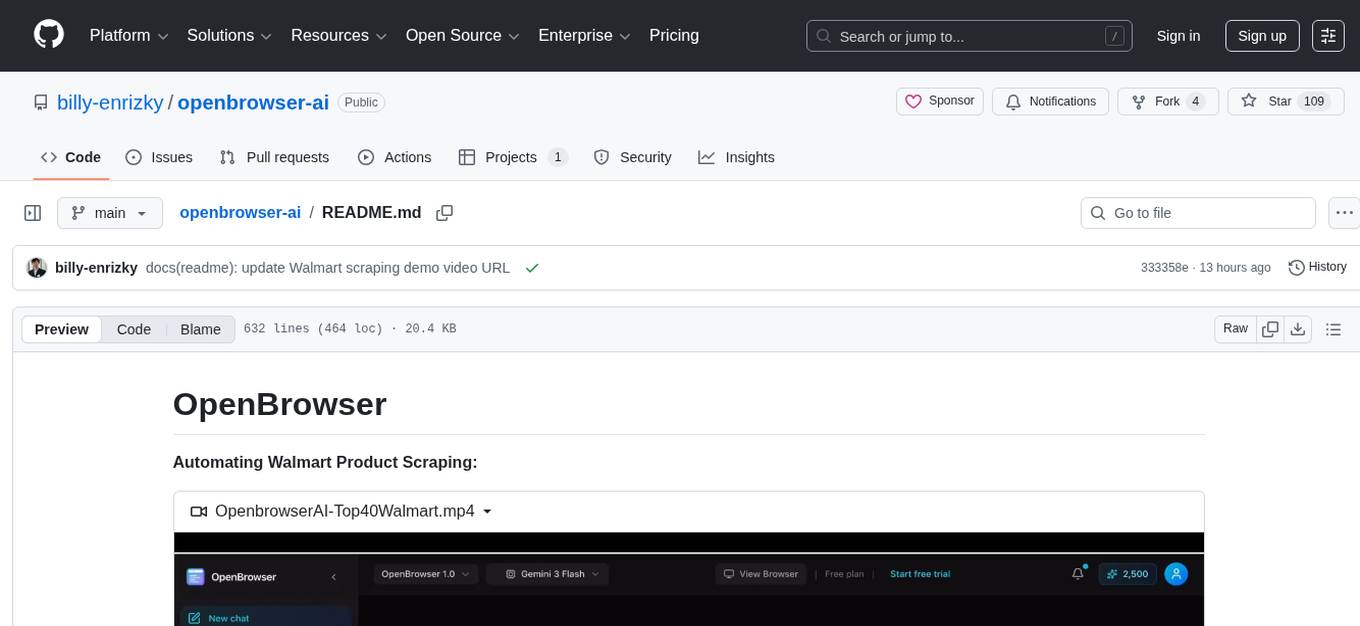
openbrowser-ai
OpenBrowser is a framework for intelligent browser automation that combines direct CDP communication with a CodeAgent architecture. It allows users to navigate, interact with, and extract information from web pages autonomously. The tool supports various LLM providers, offers vision support for screenshot analysis, and includes a MCP server for Model Context Protocol support. Users can record browser sessions as video files and benefit from features like video recording and full documentation available at docs.openbrowser.me.
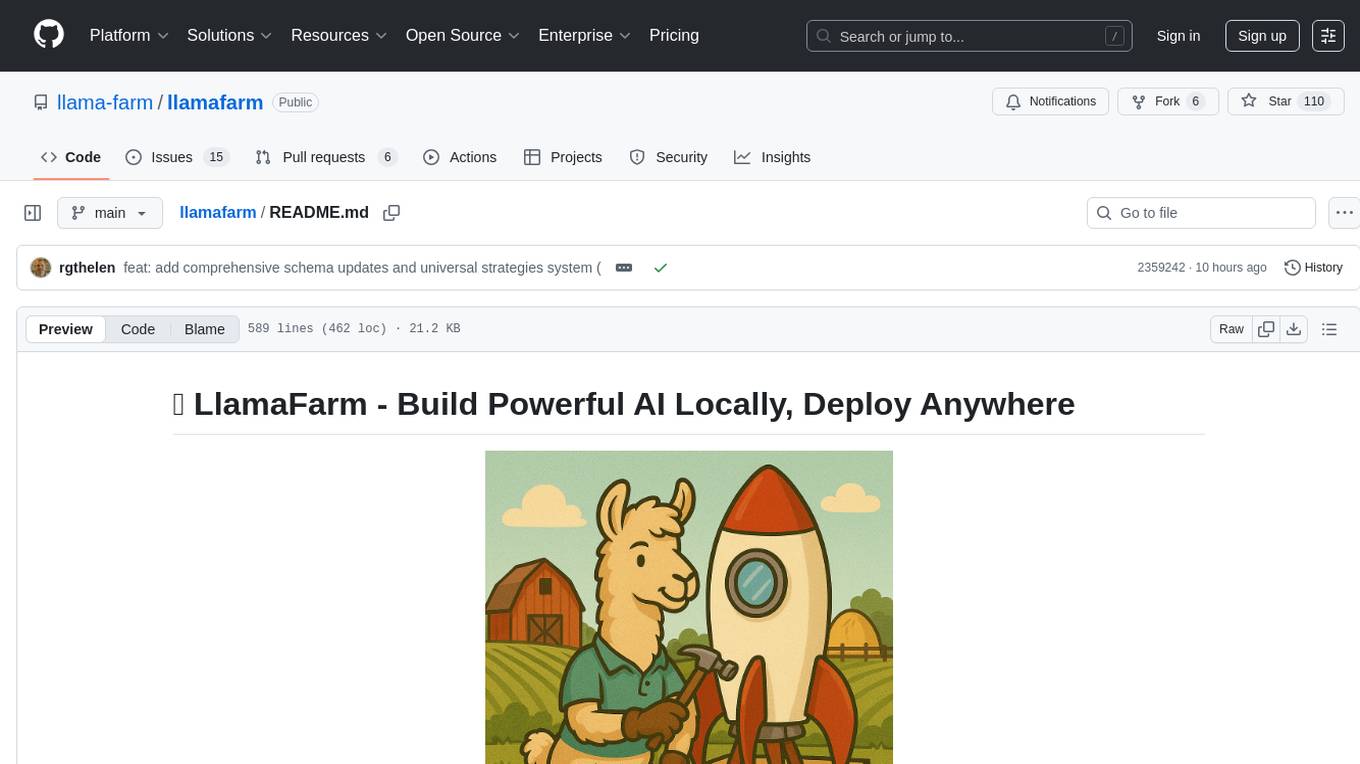
llamafarm
LlamaFarm is a comprehensive AI framework that empowers users to build powerful AI applications locally, with full control over costs and deployment options. It provides modular components for RAG systems, vector databases, model management, prompt engineering, and fine-tuning. Users can create differentiated AI products without needing extensive ML expertise, using simple CLI commands and YAML configs. The framework supports local-first development, production-ready components, strategy-based configuration, and deployment anywhere from laptops to the cloud.
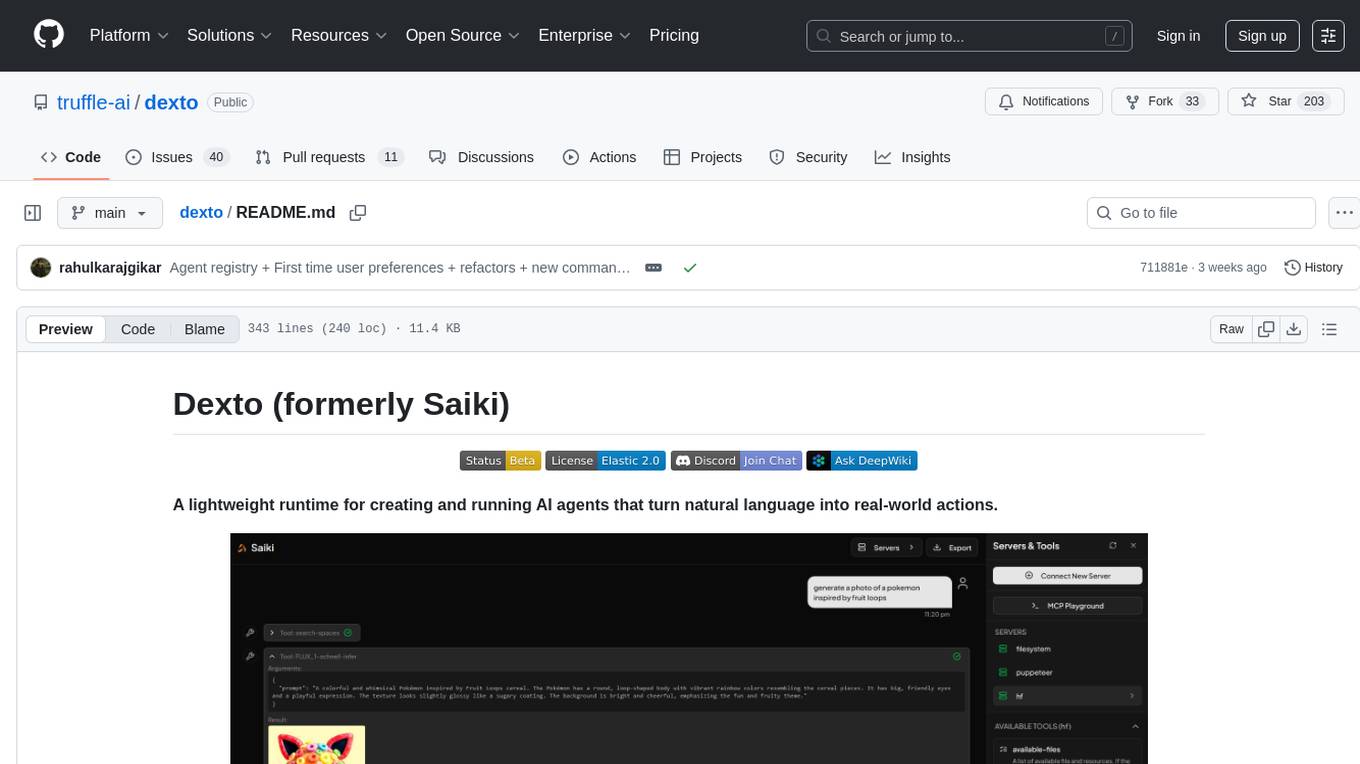
dexto
Dexto is a lightweight runtime for creating and running AI agents that turn natural language into real-world actions. It serves as the missing intelligence layer for building AI applications, standalone chatbots, or as the reasoning engine inside larger products. Dexto features a powerful CLI and Web UI for running AI agents, supports multiple interfaces, allows hot-swapping of LLMs from various providers, connects to remote tool servers via the Model Context Protocol, is config-driven with version-controlled YAML, offers production-ready core features, extensibility for custom services, and enables multi-agent collaboration via MCP and A2A.
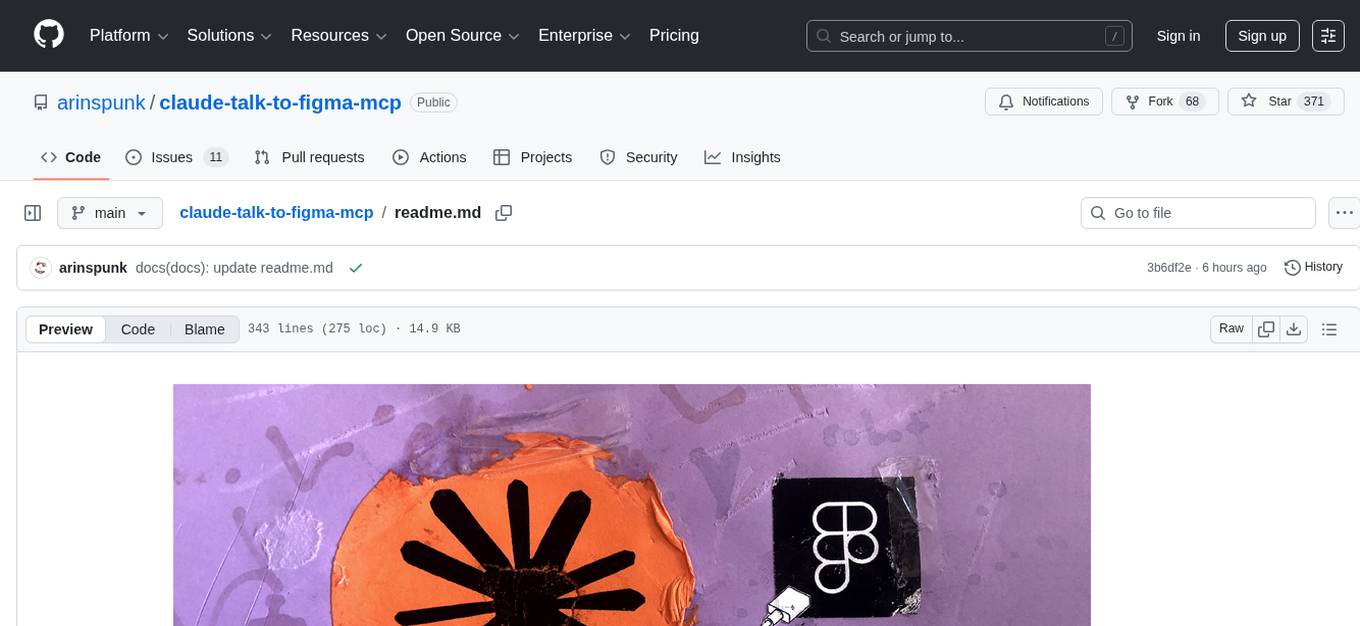
claude-talk-to-figma-mcp
A Model Context Protocol (MCP) plugin named Claude Talk to Figma MCP that enables Claude Desktop and other AI tools to interact directly with Figma for AI-assisted design capabilities. It provides document interaction, element creation, smart modifications, text mastery, and component integration. Users can connect the plugin to Figma, start designing, and utilize various tools for document analysis, element creation, modification, text manipulation, and component management. The project offers installation instructions, AI client configuration options, usage patterns, command references, troubleshooting support, testing guidelines, architecture overview, contribution guidelines, version history, and licensing information.
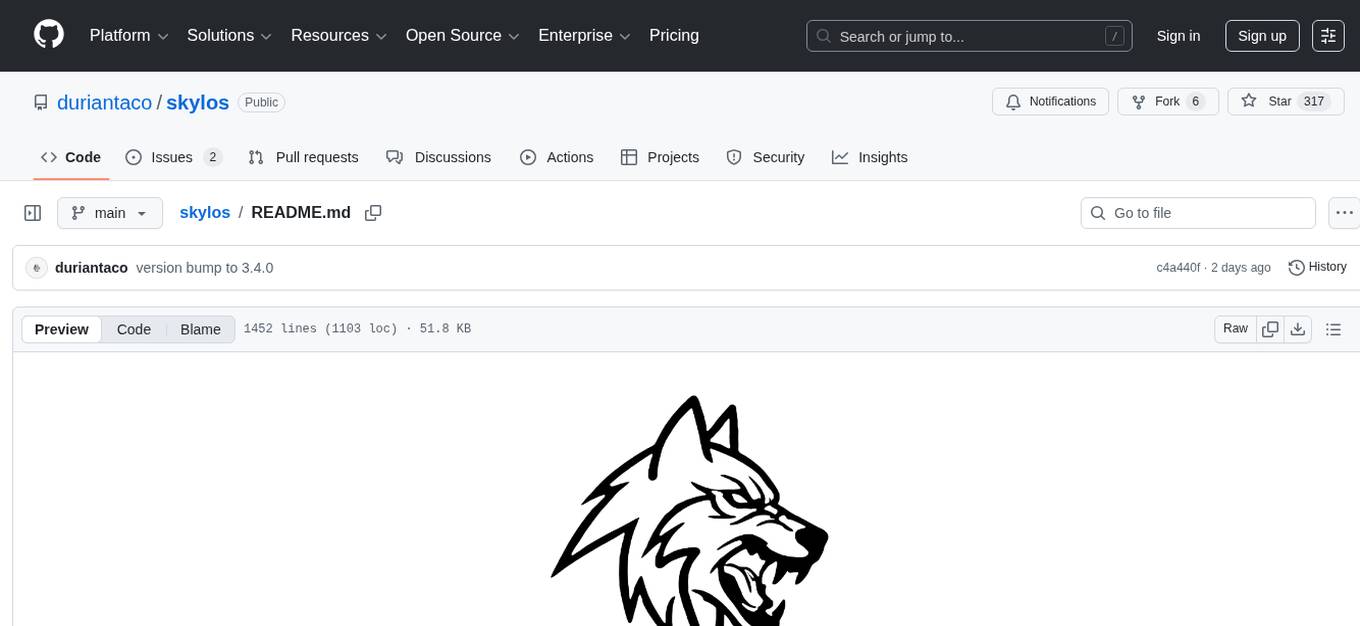
skylos
Skylos is a privacy-first SAST tool for Python, TypeScript, and Go that bridges the gap between traditional static analysis and AI agents. It detects dead code, security vulnerabilities (SQLi, SSRF, Secrets), and code quality issues with high precision. Skylos uses a hybrid engine (AST + optional Local/Cloud LLM) to eliminate false positives, verify via runtime, find logic bugs, and provide context-aware audits. It offers automated fixes, end-to-end remediation, and 100% local privacy. The tool supports taint analysis, secrets detection, vulnerability checks, dead code detection and cleanup, agentic AI and hybrid analysis, codebase optimization, operational governance, and runtime verification.
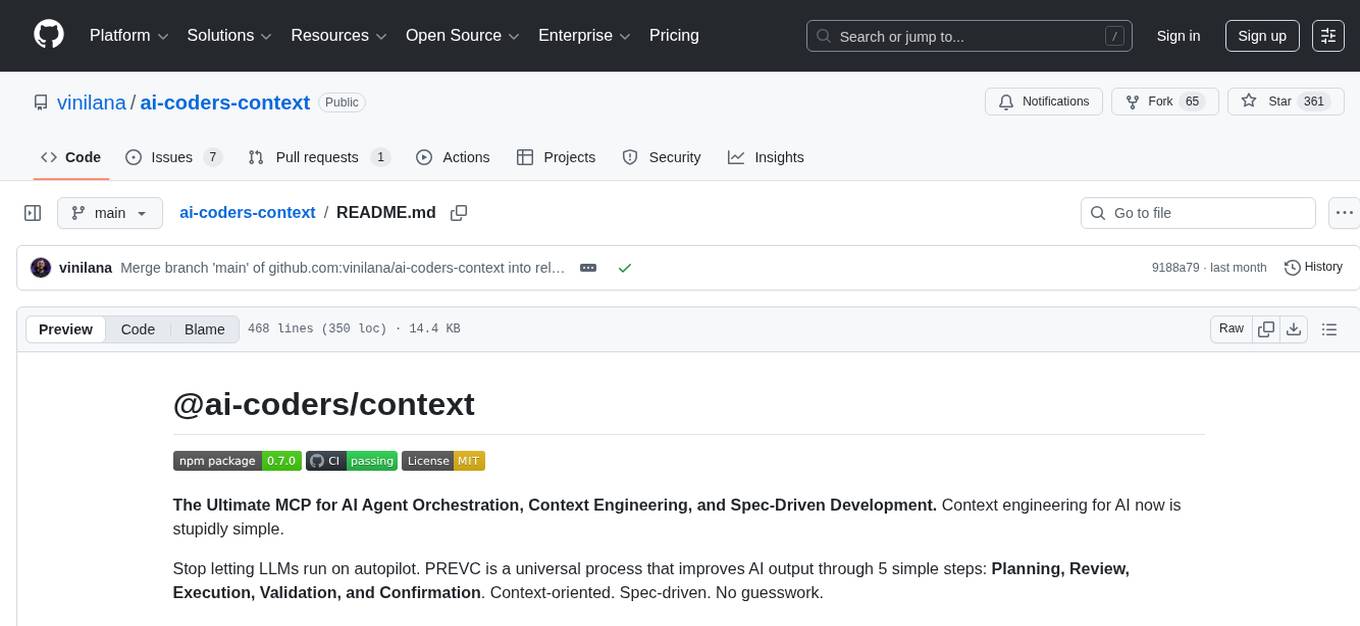
ai-coders-context
The @ai-coders/context repository provides the Ultimate MCP for AI Agent Orchestration, Context Engineering, and Spec-Driven Development. It simplifies context engineering for AI by offering a universal process called PREVC, which consists of Planning, Review, Execution, Validation, and Confirmation steps. The tool aims to address the problem of context fragmentation by introducing a single `.context/` directory that works universally across different tools. It enables users to create structured documentation, generate agent playbooks, manage workflows, provide on-demand expertise, and sync across various AI tools. The tool follows a structured, spec-driven development approach to improve AI output quality and ensure reproducible results across projects.
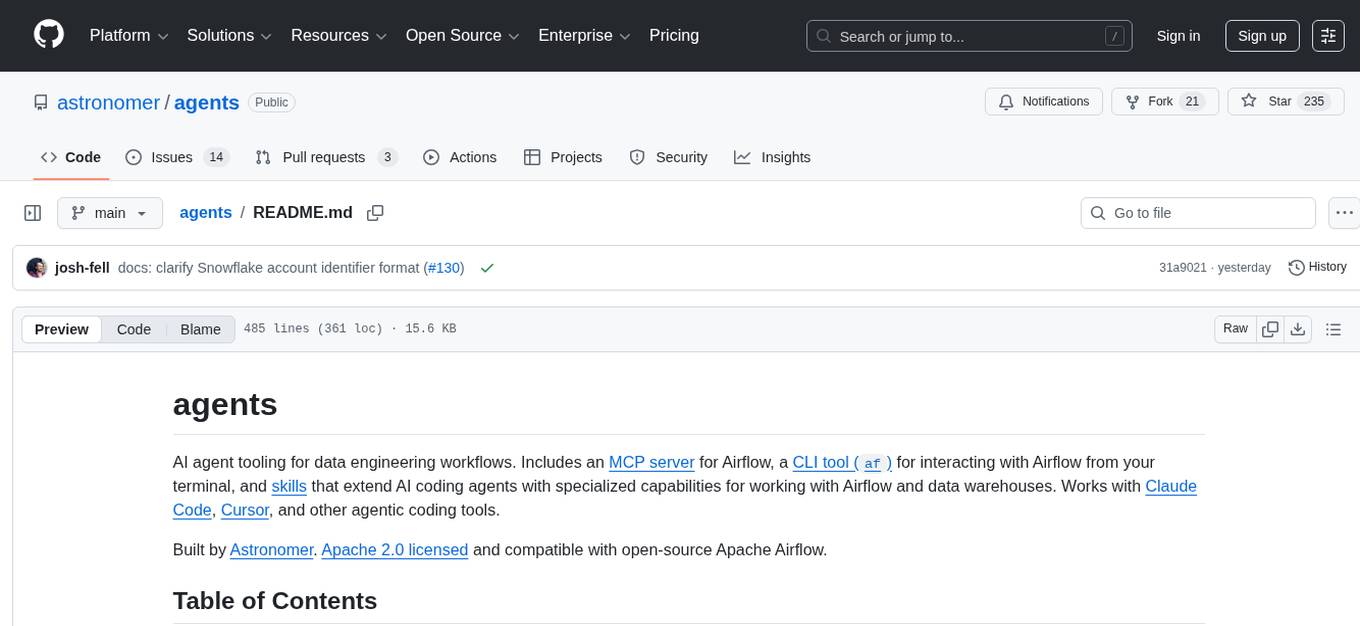
agents
AI agent tooling for data engineering workflows. Includes an MCP server for Airflow, a CLI tool for interacting with Airflow from your terminal, and skills that extend AI coding agents with specialized capabilities for working with Airflow and data warehouses. Works with Claude Code, Cursor, and other agentic coding tools. The tool provides a comprehensive set of features for data discovery & analysis, data lineage, DAG development, dbt integration, migration, and more. It also offers user journeys for data analysis flow and DAG development flow. The Airflow CLI tool allows users to interact with Airflow directly from the terminal. The tool supports various databases like Snowflake, PostgreSQL, Google BigQuery, and more, with auto-detected SQLAlchemy databases. Skills are invoked automatically based on user queries or can be invoked directly using specific commands.
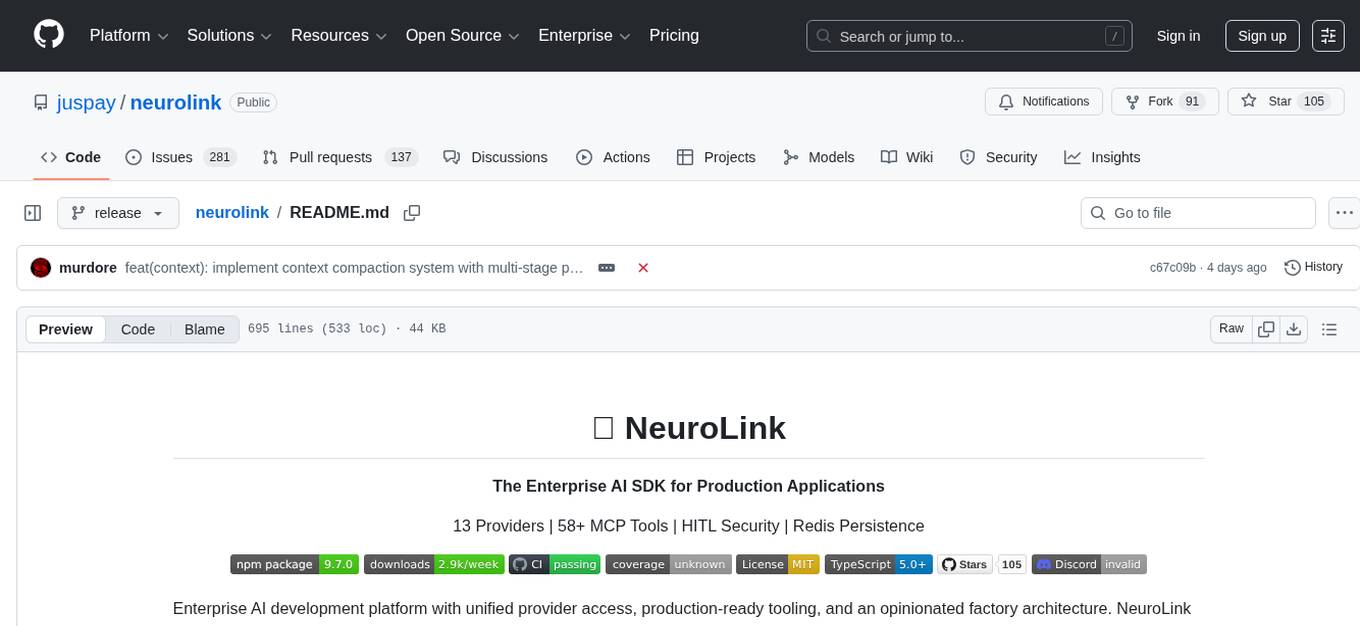
neurolink
NeuroLink is an Enterprise AI SDK for Production Applications that serves as a universal AI integration platform unifying 13 major AI providers and 100+ models under one consistent API. It offers production-ready tooling, including a TypeScript SDK and a professional CLI, for teams to quickly build, operate, and iterate on AI features. NeuroLink enables switching providers with a single parameter change, provides 64+ built-in tools and MCP servers, supports enterprise features like Redis memory and multi-provider failover, and optimizes costs automatically with intelligent routing. It is designed for the future of AI with edge-first execution and continuous streaming architectures.
For similar tasks

google_workspace_mcp
The Google Workspace MCP Server is a production-ready server that integrates major Google Workspace services with AI assistants. It supports single-user and multi-user authentication via OAuth 2.1, making it a powerful backend for custom applications. Built with FastMCP for optimal performance, it features advanced authentication handling, service caching, and streamlined development patterns. The server provides full natural language control over Google Calendar, Drive, Gmail, Docs, Sheets, Slides, Forms, Tasks, and Chat through all MCP clients, AI assistants, and developer tools. It supports free Google accounts and Google Workspace plans with expanded app options like Chat & Spaces. The server also offers private cloud instance options.
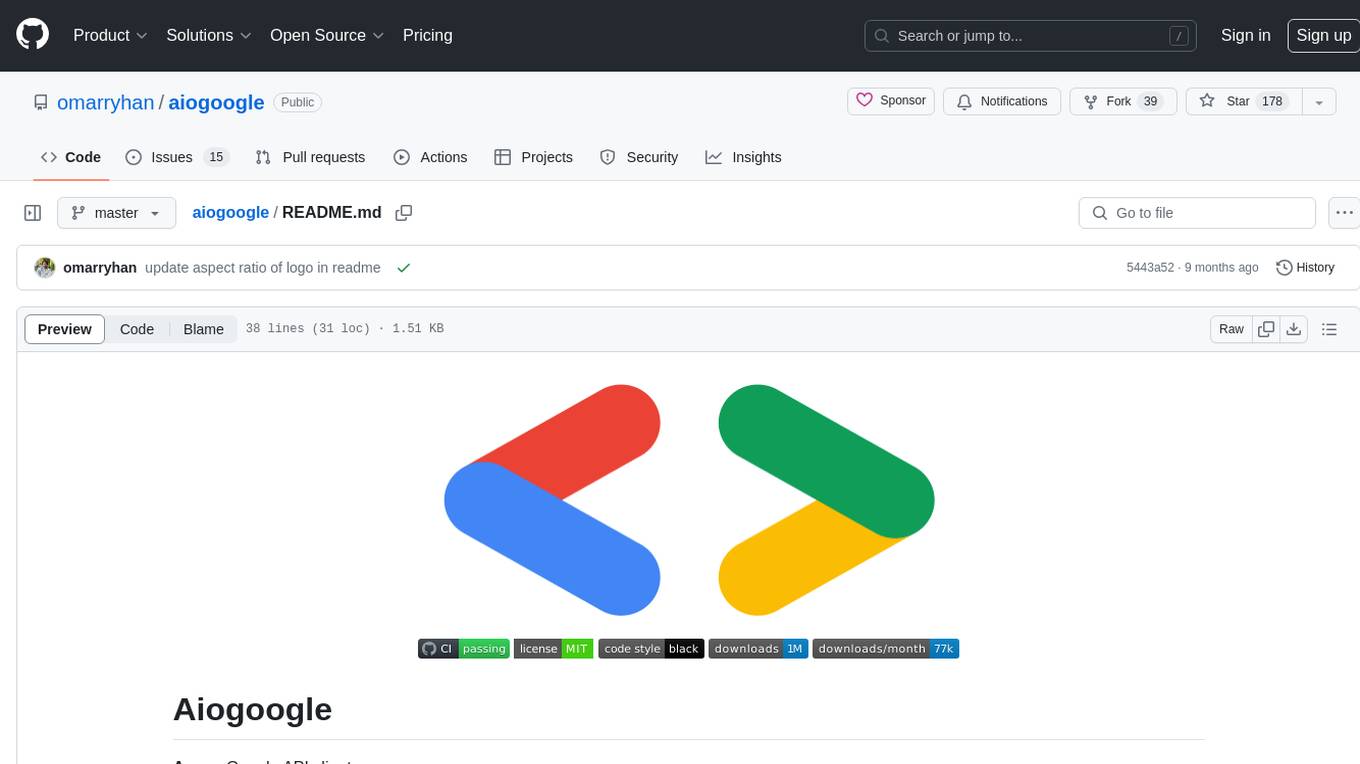
aiogoogle
Aiogoogle is an asynchronous Google API client that allows users to access various Google public APIs such as Google Calendar, Drive, Contacts, Gmail, Maps, Youtube, Translate, Sheets, Docs, Analytics, Books, Fitness, Genomics, Cloud Storage, Kubernetes Engine, and more. It simplifies the process of interacting with Google APIs by providing async capabilities.
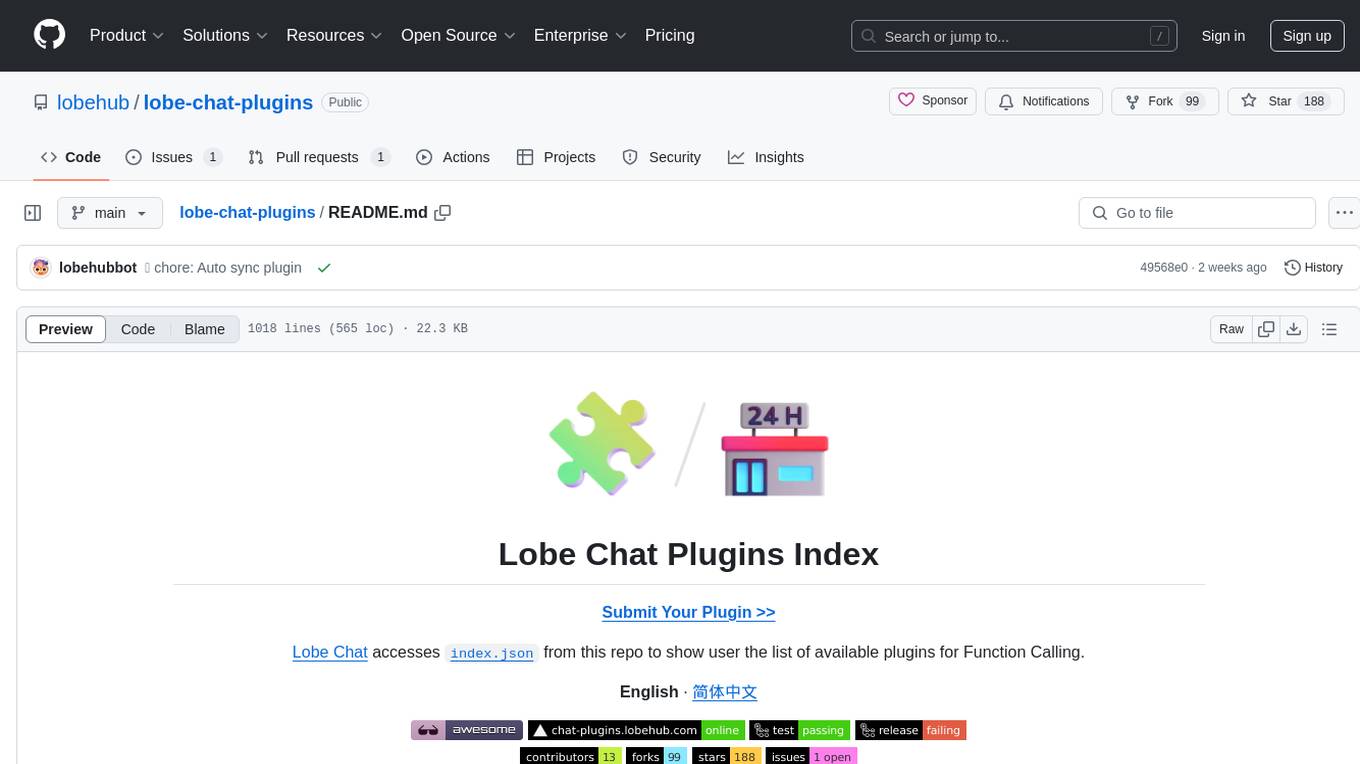
lobe-chat-plugins
Lobe Chat Plugins Index is a repository that serves as a collection of various plugins for Function Calling. Users can submit their plugins by following specific instructions. The repository includes a wide range of plugins for different tasks such as image generation, stock analysis, web search, NFT tracking, calendar management, and more. Each plugin is tagged with relevant keywords for easy identification and usage. The repository encourages contributions and provides guidelines for submitting new plugins. It is a valuable resource for developers looking to enhance chatbot functionalities with different plugins.

Sentient
Sentient is a personal, private, and interactive AI companion developed by Existence. The project aims to build a completely private AI companion that is deeply personalized and context-aware of the user. It utilizes automation and privacy to create a true companion for humans. The tool is designed to remember information about the user and use it to respond to queries and perform various actions. Sentient features a local and private environment, MBTI personality test, integrations with LinkedIn, Reddit, and more, self-managed graph memory, web search capabilities, multi-chat functionality, and auto-updates for the app. The project is built using technologies like ElectronJS, Next.js, TailwindCSS, FastAPI, Neo4j, and various APIs.
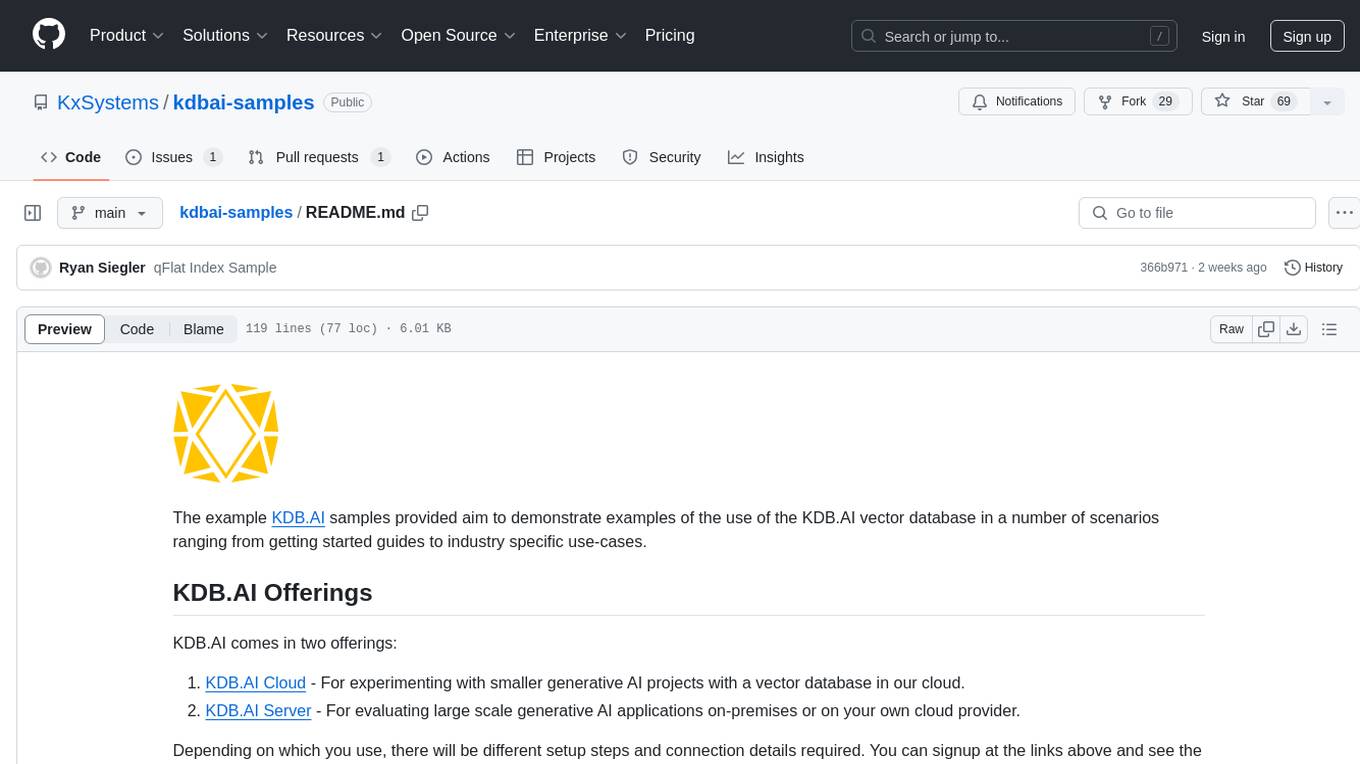
kdbai-samples
KDB.AI is a time-based vector database that allows developers to build scalable, reliable, and real-time applications by providing advanced search, recommendation, and personalization for Generative AI applications. It supports multiple index types, distance metrics, top-N and metadata filtered retrieval, as well as Python and REST interfaces. The repository contains samples demonstrating various use-cases such as temporal similarity search, document search, image search, recommendation systems, sentiment analysis, and more. KDB.AI integrates with platforms like ChatGPT, Langchain, and LlamaIndex. The setup steps require Unix terminal, Python 3.8+, and pip installed. Users can install necessary Python packages and run Jupyter notebooks to interact with the samples.
For similar jobs

sweep
Sweep is an AI junior developer that turns bugs and feature requests into code changes. It automatically handles developer experience improvements like adding type hints and improving test coverage.

teams-ai
The Teams AI Library is a software development kit (SDK) that helps developers create bots that can interact with Teams and Microsoft 365 applications. It is built on top of the Bot Framework SDK and simplifies the process of developing bots that interact with Teams' artificial intelligence capabilities. The SDK is available for JavaScript/TypeScript, .NET, and Python.

ai-guide
This guide is dedicated to Large Language Models (LLMs) that you can run on your home computer. It assumes your PC is a lower-end, non-gaming setup.

classifai
Supercharge WordPress Content Workflows and Engagement with Artificial Intelligence. Tap into leading cloud-based services like OpenAI, Microsoft Azure AI, Google Gemini and IBM Watson to augment your WordPress-powered websites. Publish content faster while improving SEO performance and increasing audience engagement. ClassifAI integrates Artificial Intelligence and Machine Learning technologies to lighten your workload and eliminate tedious tasks, giving you more time to create original content that matters.

chatbot-ui
Chatbot UI is an open-source AI chat app that allows users to create and deploy their own AI chatbots. It is easy to use and can be customized to fit any need. Chatbot UI is perfect for businesses, developers, and anyone who wants to create a chatbot.

BricksLLM
BricksLLM is a cloud native AI gateway written in Go. Currently, it provides native support for OpenAI, Anthropic, Azure OpenAI and vLLM. BricksLLM aims to provide enterprise level infrastructure that can power any LLM production use cases. Here are some use cases for BricksLLM: * Set LLM usage limits for users on different pricing tiers * Track LLM usage on a per user and per organization basis * Block or redact requests containing PIIs * Improve LLM reliability with failovers, retries and caching * Distribute API keys with rate limits and cost limits for internal development/production use cases * Distribute API keys with rate limits and cost limits for students

uAgents
uAgents is a Python library developed by Fetch.ai that allows for the creation of autonomous AI agents. These agents can perform various tasks on a schedule or take action on various events. uAgents are easy to create and manage, and they are connected to a fast-growing network of other uAgents. They are also secure, with cryptographically secured messages and wallets.

griptape
Griptape is a modular Python framework for building AI-powered applications that securely connect to your enterprise data and APIs. It offers developers the ability to maintain control and flexibility at every step. Griptape's core components include Structures (Agents, Pipelines, and Workflows), Tasks, Tools, Memory (Conversation Memory, Task Memory, and Meta Memory), Drivers (Prompt and Embedding Drivers, Vector Store Drivers, Image Generation Drivers, Image Query Drivers, SQL Drivers, Web Scraper Drivers, and Conversation Memory Drivers), Engines (Query Engines, Extraction Engines, Summary Engines, Image Generation Engines, and Image Query Engines), and additional components (Rulesets, Loaders, Artifacts, Chunkers, and Tokenizers). Griptape enables developers to create AI-powered applications with ease and efficiency.




